 Original Broadway Cast, 2023 (Masterworks Broadway)
Original Broadway Cast, 2023 (Masterworks Broadway)  (0.5 / 5) In 2021, the South Korean music industry earned around $773 million in revenue, a figure that has been increasing since K-pop as a genre began. Listening to the cast album of the Broadway musical that attempted to celebrate that art form, one question may present itself: Why? Helen Park and Max Vernon’s score does not do much to provide an answer. It’s painfully generic, veering between the cheapest, loudest form of electronic dance music, energetic pop in the style of Britney Spears, and the sappiest ballads heard on Broadway in recent memory, without ever landing on its own style. As for the lyrics, there are rhymes and off-rhymes such as “America/hysterical/generic-uh.” Like so many musicals before it, KPOP was built around a star — in this case, a Korean musical theater actress and K-pop singer named Luna. She is unquestionably talented in terms of vocal range and power, but neither she nor the rest of the cast members are well served by the material, and because of the ensemble’s non-specific diction, it’s often hard to tell which of the two languages that the show incorporates is being sung. Almost every song in this score is diegetic, performed as part of the concerts-within-the-show. As a result, the musical’s tenuous emotional arc, concerning a pseudo-Mama Rose who has pushed MwE (the character portrayed by Luna) to succeed, is totally lost in an audio recording that eliminates the book scenes. Of course, neither can the Broadway production’s highly energetic choreography or its bright, fun costumes be experienced via the cast album, which removes about 85% of what this show had to offer. Ironically, the album makes it eminently clear that this music was not meant to be listened to on its own, and you may find it difficult to distinguish any particular song from the rest. The one worthy exception is “Still I Love You,” a musical theater-esque song delivered by Luna with great beauty. While the last song of the show is titled “Blast Off,” it may appear to listeners that KPOP never rises above the level of elevator music. — Charles Kirsch
(0.5 / 5) In 2021, the South Korean music industry earned around $773 million in revenue, a figure that has been increasing since K-pop as a genre began. Listening to the cast album of the Broadway musical that attempted to celebrate that art form, one question may present itself: Why? Helen Park and Max Vernon’s score does not do much to provide an answer. It’s painfully generic, veering between the cheapest, loudest form of electronic dance music, energetic pop in the style of Britney Spears, and the sappiest ballads heard on Broadway in recent memory, without ever landing on its own style. As for the lyrics, there are rhymes and off-rhymes such as “America/hysterical/generic-uh.” Like so many musicals before it, KPOP was built around a star — in this case, a Korean musical theater actress and K-pop singer named Luna. She is unquestionably talented in terms of vocal range and power, but neither she nor the rest of the cast members are well served by the material, and because of the ensemble’s non-specific diction, it’s often hard to tell which of the two languages that the show incorporates is being sung. Almost every song in this score is diegetic, performed as part of the concerts-within-the-show. As a result, the musical’s tenuous emotional arc, concerning a pseudo-Mama Rose who has pushed MwE (the character portrayed by Luna) to succeed, is totally lost in an audio recording that eliminates the book scenes. Of course, neither can the Broadway production’s highly energetic choreography or its bright, fun costumes be experienced via the cast album, which removes about 85% of what this show had to offer. Ironically, the album makes it eminently clear that this music was not meant to be listened to on its own, and you may find it difficult to distinguish any particular song from the rest. The one worthy exception is “Still I Love You,” a musical theater-esque song delivered by Luna with great beauty. While the last song of the show is titled “Blast Off,” it may appear to listeners that KPOP never rises above the level of elevator music. — Charles Kirsch
Category Archives: J-K
Kimberly Akimbo
 Original Broadway Cast, 2023 (Ghostlight)
Original Broadway Cast, 2023 (Ghostlight)  (5 / 5) Based on David Lindsay-Abaire’s play of the same title, Kimberly Akimbo tells the story of Kimberly Levaco (Victoria Clark), a girl with a rare disease that causes her body to age rapidly, causing her to look 65 at the age of 16. Despite this major setback, Kimberly is determined to enjoy as much of her life as she can, since she’s unsure just how much longer her life will last. It’s that blend of sardonic edge and heartfelt optimism that ultimately makes this such a special musical. In their second collaboration, Lindsay-Abaire and composer Jeanine Tesori have created an unassuming work that hides its creativity and complexity in plain sight. Abaire’s lyrics are exceptionally intelligent, sometimes taking twisted turns (the hilarious “Better”) and sometimes deeply earnest (the quietly devastating “Before I Go”), but always organic to the story and characters, and never calling attention to themselves. Tesori, meanwhile, proves once again that she is one of the most versatile musical theater composers around. She has created here a score filled with pastiches of numerous song genres (’90s folk, ’70s disco, blues, current pop, faux-classical), yet the score never has the feeling of oscillating from one style to the other; rather, it seamlessly blends. The cast is exceptional. Steven Boyer and Alli Mauzey are appropriately narcissistic as Kimberly’s parents, getting a chance to show their characters’ messiness (in Boyer’s “Happy for Her” and Mauzey’s “Hello Darling” and reprises) while also displaying some depth (in “Hello Baby” and “Father Time”). Bonnie Milligan is a scene stealer as Kimberly’s delinquent aunt Debra, whose latest scheme consumes much of the plot of Act Two. Given the most off kilter humor of the show, Milligan offers dry delivery of dialogue and barn raising vocals that ground Abaire’s comedy, keeping songs such as “Better” and “How to Wash a Check” from going off the rails. Justin Cooley is incredibly charming as Kimberly’s classmate Seth, who has a passion for making anagrams (the show’s title is a blend of Kimberly’s name and the anagram Seth makes out of it). At the center of it all, Clark is other-worldly good in the title role. In songs like “Anagram” and “Make a Wish,” one can hear her communicate Kimberly’s teenage spirit while also embracing the character’s elderly body and voice, but Clark refuses to go broad or become a caricature. Like the musical itself, the simplicity of her performance is what makes it so profound. Happily, the audio quality of this recording is so crisp and clear that listeners can hear every nuance of the vocal performances, as well as John Clancy’s multi-faceted orchestrations and Tesori’s tight vocal arrangements for the teenage ensemble. One could keep going on about every minute aspect of this cast album, but the ultimate praise is to tell you to just go ahead and listen. And then listen again. And again. — Matt Koplik
(5 / 5) Based on David Lindsay-Abaire’s play of the same title, Kimberly Akimbo tells the story of Kimberly Levaco (Victoria Clark), a girl with a rare disease that causes her body to age rapidly, causing her to look 65 at the age of 16. Despite this major setback, Kimberly is determined to enjoy as much of her life as she can, since she’s unsure just how much longer her life will last. It’s that blend of sardonic edge and heartfelt optimism that ultimately makes this such a special musical. In their second collaboration, Lindsay-Abaire and composer Jeanine Tesori have created an unassuming work that hides its creativity and complexity in plain sight. Abaire’s lyrics are exceptionally intelligent, sometimes taking twisted turns (the hilarious “Better”) and sometimes deeply earnest (the quietly devastating “Before I Go”), but always organic to the story and characters, and never calling attention to themselves. Tesori, meanwhile, proves once again that she is one of the most versatile musical theater composers around. She has created here a score filled with pastiches of numerous song genres (’90s folk, ’70s disco, blues, current pop, faux-classical), yet the score never has the feeling of oscillating from one style to the other; rather, it seamlessly blends. The cast is exceptional. Steven Boyer and Alli Mauzey are appropriately narcissistic as Kimberly’s parents, getting a chance to show their characters’ messiness (in Boyer’s “Happy for Her” and Mauzey’s “Hello Darling” and reprises) while also displaying some depth (in “Hello Baby” and “Father Time”). Bonnie Milligan is a scene stealer as Kimberly’s delinquent aunt Debra, whose latest scheme consumes much of the plot of Act Two. Given the most off kilter humor of the show, Milligan offers dry delivery of dialogue and barn raising vocals that ground Abaire’s comedy, keeping songs such as “Better” and “How to Wash a Check” from going off the rails. Justin Cooley is incredibly charming as Kimberly’s classmate Seth, who has a passion for making anagrams (the show’s title is a blend of Kimberly’s name and the anagram Seth makes out of it). At the center of it all, Clark is other-worldly good in the title role. In songs like “Anagram” and “Make a Wish,” one can hear her communicate Kimberly’s teenage spirit while also embracing the character’s elderly body and voice, but Clark refuses to go broad or become a caricature. Like the musical itself, the simplicity of her performance is what makes it so profound. Happily, the audio quality of this recording is so crisp and clear that listeners can hear every nuance of the vocal performances, as well as John Clancy’s multi-faceted orchestrations and Tesori’s tight vocal arrangements for the teenage ensemble. One could keep going on about every minute aspect of this cast album, but the ultimate praise is to tell you to just go ahead and listen. And then listen again. And again. — Matt Koplik
& Juliet
 Original London Cast, 2019
Original London Cast, 2019  (3 / 5) & Juliet is, yes, another musical twist on Shakespeare, but one that’s worthy of joining the large canon that already includes such shows as Kiss Me, Kate, West Side Story, Your Own Thing, and Two Gentlemen of Verona. The plot revolves around Shakespeare’s wife Anne Hathaway -– an annoyingly affected Cassidy Janson on this recording — trying to convince her begrudging husband, suavely sung by Oliver Tompsett, to change the ending of his new play, Romeo & Juliet, to let the leading lady live and reclaim her power. The story is told in a very modern way by using the music of pop songwriter Max Martin, who has penned hits for Britney Spears, Katy Perry, Taylor Swift, et al. These songs fit very smoothly into the plot but, of course, you won’t get much of a sense of that from the cast album. On that note, any recording of a jukebox musical prompts the same question: Without a script attached, is it worth hearing musical theater artists perform pop songs that we already know and love in their original versions? In one case here, at least, the answer is very much “yes”: From the first time we hear Miriam Teak-Lee as Juliet in the album’s third track, “…Baby One More Time,” to her final, soaring harmonies in “Roar,” it’s clear that she possesses the ability to wrap her voice around the riffs and the admittedly 1D emotions of these songs. Other performers, especially the butter-voiced Jordan Luke Gage as Romeo, do well also, though the comically exaggerated performances of Melanie LaBarrie as the Nurse and David Bedella as Lance De Bois, the strict father of Juliet’s new love interest, seem to have gotten a bit lost in translation to the medium of an audio recording. A bonus cover of “One More Try” by Jessie J accents the disparity between pop and theater voices that only Teak-Lee bridges with complete success. If this cast album can’t offer a good picture of the wit, the positive themes, or the spectacle of & Juliet, what it does offer is a veritable candy box of rich orchestrations and strong singers that may leave listeners saying, to quote a song that’s repeated throughout the show, “I want it that way.” — Charles Kirsch
(3 / 5) & Juliet is, yes, another musical twist on Shakespeare, but one that’s worthy of joining the large canon that already includes such shows as Kiss Me, Kate, West Side Story, Your Own Thing, and Two Gentlemen of Verona. The plot revolves around Shakespeare’s wife Anne Hathaway -– an annoyingly affected Cassidy Janson on this recording — trying to convince her begrudging husband, suavely sung by Oliver Tompsett, to change the ending of his new play, Romeo & Juliet, to let the leading lady live and reclaim her power. The story is told in a very modern way by using the music of pop songwriter Max Martin, who has penned hits for Britney Spears, Katy Perry, Taylor Swift, et al. These songs fit very smoothly into the plot but, of course, you won’t get much of a sense of that from the cast album. On that note, any recording of a jukebox musical prompts the same question: Without a script attached, is it worth hearing musical theater artists perform pop songs that we already know and love in their original versions? In one case here, at least, the answer is very much “yes”: From the first time we hear Miriam Teak-Lee as Juliet in the album’s third track, “…Baby One More Time,” to her final, soaring harmonies in “Roar,” it’s clear that she possesses the ability to wrap her voice around the riffs and the admittedly 1D emotions of these songs. Other performers, especially the butter-voiced Jordan Luke Gage as Romeo, do well also, though the comically exaggerated performances of Melanie LaBarrie as the Nurse and David Bedella as Lance De Bois, the strict father of Juliet’s new love interest, seem to have gotten a bit lost in translation to the medium of an audio recording. A bonus cover of “One More Try” by Jessie J accents the disparity between pop and theater voices that only Teak-Lee bridges with complete success. If this cast album can’t offer a good picture of the wit, the positive themes, or the spectacle of & Juliet, what it does offer is a veritable candy box of rich orchestrations and strong singers that may leave listeners saying, to quote a song that’s repeated throughout the show, “I want it that way.” — Charles Kirsch
 Original Broadway Cast, 2022 (Atlantic)
Original Broadway Cast, 2022 (Atlantic)  (4 / 5) Other than the accents, the biggest difference between the two recordings of & Juliet is the use of interstitial dialogue on the Broadway album – or, more accurately, the Toronto album, as that’s where this one was recorded pre-Broadway. (Katy Geraghty, who left the show before it arrived at the Stephen Sondheim Theatre, is still credited here in the role of Lucy). The improvement is tangible, as the snippets of the book that are included give us the context in which the hit songs are used and also play up one of the elements that makes the show as a whole so enjoyable: its humor. Pop song lyrics tend to be somewhat banal, a fact that’s unfortunately accented here because of the slightly more subdued tone of this album as compared to the London one. This is partially due to the sound mixing, which makes the voices slightly softer; but also because of the cast, which, to paraphrase a different show, has its aces in very different places. While Lorna Courtney as Juliet is very talented and adds her own, individual spark to the songs, she’s not quite the exploding firecracker that Miriam Teak-Lee is. Instead, Betsy Wolfe as Anne Hathaway becomes the focus of this album; not only is she a splendid singer, she adds a taste of her enormous acting talent in several sections of spoken dialogue, enough to elevate the material. More happy news is that Philippe Arroyo and Justin David Sullivan as the show’s (arguably) central couple, Francois and May, shine brighter than their London counterparts. Since Wolfe, Arroyo, and Sullivan get to sing most of the quieter pop songs in the score, those moments become the highlights of this recording. (That fact does highlight a structural problem with the album: you’ll often hear one bombastic number right after another, followed by a section in which all you get is the characters’ musical thoughts on frustrated love or identity, the most glaring example being the sequence of songs that stretches from “Whataya Want from Me” to “That’s the Way It Is.”) Melanie La Barrie, the only holdover from the London cast, fares better here, giving slightly subtler and more charming renditions of “Domino” and “Fuckin’ Perfect.” Ben Jackson Walker as Romeo is somewhat generic if inoffensive, and Paulo Szot’s out-of-place operatic voice makes the comedy of Lance really pop. While Stark Sands as a comically smug Shakespeare riffs a bit shakily at the start, in the end he gives a perfectly sweet performance. Fittingly, there’s a new pop-star cover for this album: “Since U Been Gone” as sung by Kelly Clarkson (joined by Lorna Courtney). As of this writing, & Juliet seems to have become a hit on Broadway. Since it’s likely to earn a place alongside Jersey Boys and Beautiful among the most successful of the “jukebox musicals,” any theater fan should get to know it now — and they’re advised to use this recording to help. — C.K.
(4 / 5) Other than the accents, the biggest difference between the two recordings of & Juliet is the use of interstitial dialogue on the Broadway album – or, more accurately, the Toronto album, as that’s where this one was recorded pre-Broadway. (Katy Geraghty, who left the show before it arrived at the Stephen Sondheim Theatre, is still credited here in the role of Lucy). The improvement is tangible, as the snippets of the book that are included give us the context in which the hit songs are used and also play up one of the elements that makes the show as a whole so enjoyable: its humor. Pop song lyrics tend to be somewhat banal, a fact that’s unfortunately accented here because of the slightly more subdued tone of this album as compared to the London one. This is partially due to the sound mixing, which makes the voices slightly softer; but also because of the cast, which, to paraphrase a different show, has its aces in very different places. While Lorna Courtney as Juliet is very talented and adds her own, individual spark to the songs, she’s not quite the exploding firecracker that Miriam Teak-Lee is. Instead, Betsy Wolfe as Anne Hathaway becomes the focus of this album; not only is she a splendid singer, she adds a taste of her enormous acting talent in several sections of spoken dialogue, enough to elevate the material. More happy news is that Philippe Arroyo and Justin David Sullivan as the show’s (arguably) central couple, Francois and May, shine brighter than their London counterparts. Since Wolfe, Arroyo, and Sullivan get to sing most of the quieter pop songs in the score, those moments become the highlights of this recording. (That fact does highlight a structural problem with the album: you’ll often hear one bombastic number right after another, followed by a section in which all you get is the characters’ musical thoughts on frustrated love or identity, the most glaring example being the sequence of songs that stretches from “Whataya Want from Me” to “That’s the Way It Is.”) Melanie La Barrie, the only holdover from the London cast, fares better here, giving slightly subtler and more charming renditions of “Domino” and “Fuckin’ Perfect.” Ben Jackson Walker as Romeo is somewhat generic if inoffensive, and Paulo Szot’s out-of-place operatic voice makes the comedy of Lance really pop. While Stark Sands as a comically smug Shakespeare riffs a bit shakily at the start, in the end he gives a perfectly sweet performance. Fittingly, there’s a new pop-star cover for this album: “Since U Been Gone” as sung by Kelly Clarkson (joined by Lorna Courtney). As of this writing, & Juliet seems to have become a hit on Broadway. Since it’s likely to earn a place alongside Jersey Boys and Beautiful among the most successful of the “jukebox musicals,” any theater fan should get to know it now — and they’re advised to use this recording to help. — C.K.
Kid Victory
 Original Off-Broadway Cast, 2017 (Broadway Records)
Original Off-Broadway Cast, 2017 (Broadway Records)  (4 / 5) Kid Victory premiered at the Signature Theatre in Arlington, VA in 2015, and played a limited run Off Broadway at the Vineyard in 2017. One would be hard-pressed to find more beautiful, haunting melodies than those created by John Kander for this show, and just as hard pressed to find a darker, more disturbing plot (book and lyrics by Greg Pierce): Seventeen-year-old Luke (the wonderful Brandon Flynn) has just returned to his family after a year in the captivity of a man who had abducted him. This is a score of stark contrasts, beginning with the “Opening/Lord, Carry Me Home,” in which the prayers sung at the boy’s parents’ church shift into hostile voices in Luke’s imagination. Meanwhile, his mother (Kander veteran Karen Ziemba) burbles how their friends will be ecstatic to see Luke again. The contrasts continue in “The Marble,” as a well-meaning amateur therapist (Ann Arvia) tries to treat Luke but conjures up memories of his kidnapper, Michael (Jeffry Denman). Luke’s existence has been bifurcated into before his ordeal and after, as his mom poignantly notes in “There Was a Boy,” so Kander and Pierce made some bold choices reflecting that. Several songs are punctuated with dialogue, while others are startlingly short. Characters appear for single numbers — among them the sheriff, Luke’s ex-girlfriend, and Andrew, a gay teen whose show biz-styled “What’s the Point?” indicates he’s unlike others in this small town. The quirky shopkeeper Emily (Dee Roscioli) has her own troubled past, yet her “People Like Us” resonates with Luke. Throughout the score, Luke does not sing a note, a device meant to convey his trauma; there is no escape from his memories of Michael, alternately charming and chilling. Denman’s performance is masterful and terrifying, from the way Michael angrily snaps while retelling a Viking saga (“Vinland”) to his insidious plotting in the seemingly innocent “Regatta 500” to the tragic “You, If Anyone” — a heartbreaking melody paired with Michael’s idealistic hopes for Luke’s future, beautiful until one realizes the context. A pat ending would have Luke singing in recovery, but this score is too honest for that. Instead, Luke’s dad (Daniel Jenkins), a character on the periphery until now, reaches out to his son in “Where We Are,” another brief, yet illuminating number. Luke isn’t whole yet, but his Dad is trying to connect with him. And that’s a start. — Laura Frankos
(4 / 5) Kid Victory premiered at the Signature Theatre in Arlington, VA in 2015, and played a limited run Off Broadway at the Vineyard in 2017. One would be hard-pressed to find more beautiful, haunting melodies than those created by John Kander for this show, and just as hard pressed to find a darker, more disturbing plot (book and lyrics by Greg Pierce): Seventeen-year-old Luke (the wonderful Brandon Flynn) has just returned to his family after a year in the captivity of a man who had abducted him. This is a score of stark contrasts, beginning with the “Opening/Lord, Carry Me Home,” in which the prayers sung at the boy’s parents’ church shift into hostile voices in Luke’s imagination. Meanwhile, his mother (Kander veteran Karen Ziemba) burbles how their friends will be ecstatic to see Luke again. The contrasts continue in “The Marble,” as a well-meaning amateur therapist (Ann Arvia) tries to treat Luke but conjures up memories of his kidnapper, Michael (Jeffry Denman). Luke’s existence has been bifurcated into before his ordeal and after, as his mom poignantly notes in “There Was a Boy,” so Kander and Pierce made some bold choices reflecting that. Several songs are punctuated with dialogue, while others are startlingly short. Characters appear for single numbers — among them the sheriff, Luke’s ex-girlfriend, and Andrew, a gay teen whose show biz-styled “What’s the Point?” indicates he’s unlike others in this small town. The quirky shopkeeper Emily (Dee Roscioli) has her own troubled past, yet her “People Like Us” resonates with Luke. Throughout the score, Luke does not sing a note, a device meant to convey his trauma; there is no escape from his memories of Michael, alternately charming and chilling. Denman’s performance is masterful and terrifying, from the way Michael angrily snaps while retelling a Viking saga (“Vinland”) to his insidious plotting in the seemingly innocent “Regatta 500” to the tragic “You, If Anyone” — a heartbreaking melody paired with Michael’s idealistic hopes for Luke’s future, beautiful until one realizes the context. A pat ending would have Luke singing in recovery, but this score is too honest for that. Instead, Luke’s dad (Daniel Jenkins), a character on the periphery until now, reaches out to his son in “Where We Are,” another brief, yet illuminating number. Luke isn’t whole yet, but his Dad is trying to connect with him. And that’s a start. — Laura Frankos
Jersey Boys
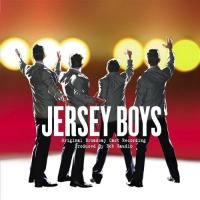 Original Broadway Cast, 2005 (Rhino)
Original Broadway Cast, 2005 (Rhino)  (3 / 5) Jersey Boys tells the true story of the rise of the phenomenally successful 1960s pop singing group The Four Seasons — or, at least, true to whoever is in charge of the story at whatever point in the show. Rather than presenting a straightforward narrative, book writers Rick Elice and Marshall Brickman have each member of the group — here played by John Lloyd Young (Frankie Valli), Christian Hoff (Tommy DeVito), Daniel Reichard (Bob Gaudio), and J. Robert Spencer (Nick Massi) — take turns in telling the audience their version of the group’s rise and fall. The idea works because all four men make insightful, humorous, and (due to frequent contradictions with each other) unreliable narrators, giving the show an extra edge. This recording includes much of that well-crafted narration without interrupting the musical flow of the album. All four leading men have an easy charm and a singing style that lends the recording a sense of authenticity — as does the fact that it was produced by the real-life Bob Gaudio. In particular, Young does an excellent job of adapting his voice to resemble Frankie Valli and his famous falsetto without sounding like an imitation. Ron Melrose’s vocal arrangements and Steve Orich’s orchestrations are essentially period-appropriate. Unlike other jukebox musicals, Jersey Boys doesn’t aim to do anything new with the preexisting songs but, instead, offers a fun, fresh representation with smart, dramatically compelling commentary. — Matt Koplik
(3 / 5) Jersey Boys tells the true story of the rise of the phenomenally successful 1960s pop singing group The Four Seasons — or, at least, true to whoever is in charge of the story at whatever point in the show. Rather than presenting a straightforward narrative, book writers Rick Elice and Marshall Brickman have each member of the group — here played by John Lloyd Young (Frankie Valli), Christian Hoff (Tommy DeVito), Daniel Reichard (Bob Gaudio), and J. Robert Spencer (Nick Massi) — take turns in telling the audience their version of the group’s rise and fall. The idea works because all four men make insightful, humorous, and (due to frequent contradictions with each other) unreliable narrators, giving the show an extra edge. This recording includes much of that well-crafted narration without interrupting the musical flow of the album. All four leading men have an easy charm and a singing style that lends the recording a sense of authenticity — as does the fact that it was produced by the real-life Bob Gaudio. In particular, Young does an excellent job of adapting his voice to resemble Frankie Valli and his famous falsetto without sounding like an imitation. Ron Melrose’s vocal arrangements and Steve Orich’s orchestrations are essentially period-appropriate. Unlike other jukebox musicals, Jersey Boys doesn’t aim to do anything new with the preexisting songs but, instead, offers a fun, fresh representation with smart, dramatically compelling commentary. — Matt Koplik
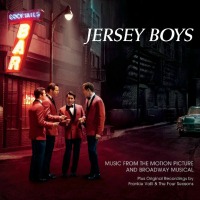 Film Soundtrack, 2014 (Rhino) No stars, not recommended. In bringing this hit jukebox/bio-musical to the screen, director Clint Eastwood remained mostly faithful to the stage material but chose to capture it through a more somber filter. This might have made for an emotionally compelling film, but in fact, it robs Jersey Boys of most of its charm and energy. The soundtrack album reflects this, despite the efforts of the talented quartet representing the Four Seasons: John Lloyd Young is back as Valli, with Vincent Piazza as Tommy DeVito, Erich Bergen as Bob Gaudio, and Michael Lomenda as Nick Massi. Oddly, the album’s producers opted to insert the real-life Frankie Valli’s renditions of certain songs in various places, giving the listener whiplash as we go from Valli to Young to Valli and back. There are also some excerpts from the Broadway cast album, which makes things even more confusing. Young is still in strong voice, and Bergen, Lomenda, and Piazza do a fine job of filling out the quartet — although, without any of the characters’ dialogue included here, Bergen is the only one of the remaining three to get a chance to shine (in “Cry For Me”). Because of the lack of dialogue and any sense of narrative, this soundtrack pales in comparison to the Broadway cast recording of Jersey Boys or any “Best of The Four Seasons” compilation album. — M.K.
Film Soundtrack, 2014 (Rhino) No stars, not recommended. In bringing this hit jukebox/bio-musical to the screen, director Clint Eastwood remained mostly faithful to the stage material but chose to capture it through a more somber filter. This might have made for an emotionally compelling film, but in fact, it robs Jersey Boys of most of its charm and energy. The soundtrack album reflects this, despite the efforts of the talented quartet representing the Four Seasons: John Lloyd Young is back as Valli, with Vincent Piazza as Tommy DeVito, Erich Bergen as Bob Gaudio, and Michael Lomenda as Nick Massi. Oddly, the album’s producers opted to insert the real-life Frankie Valli’s renditions of certain songs in various places, giving the listener whiplash as we go from Valli to Young to Valli and back. There are also some excerpts from the Broadway cast album, which makes things even more confusing. Young is still in strong voice, and Bergen, Lomenda, and Piazza do a fine job of filling out the quartet — although, without any of the characters’ dialogue included here, Bergen is the only one of the remaining three to get a chance to shine (in “Cry For Me”). Because of the lack of dialogue and any sense of narrative, this soundtrack pales in comparison to the Broadway cast recording of Jersey Boys or any “Best of The Four Seasons” compilation album. — M.K.
Kinky Boots
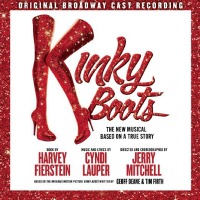 Original Broadway Cast, 2013 (Sony Masterworks Broadway)
Original Broadway Cast, 2013 (Sony Masterworks Broadway)  (3 / 5) Kinky Boots marked 80’s pop icon Cyndi Lauper’s debut as a Broadway songwriter. Based on the film of the same title, the musical is about the owner of a struggling shoe factory in England who revives his business by teaming with a transvestite and making shoes for men who love to don heels. Though it may sound like indie fare, the show became an instant success, winning the Tony Award for Best Musical and nabbing Lauper a Tony for her work, as well. For a freshman effort, it’s a fun, admirable score, but there is still some room for Lauper to grow as a musical theater writer. Musically, she is very gifted, and her pop sound provides the cast album with many catchy tunes. With the help of crisp arrangements and orchestrations by Stephen Oremus, songs such as “Everybody Say Yeah” and “In This Corner” create a sense of heat and fizz, allowing the cast to let loose and show off their vocal dynamics. As a lyricist, Lauper is at her best when cheeky; songs like “Land of Lola” or “Sex is in the Heel” work because of their sly flirtatiousness (e.g., “We give good epiphany”). However, when Lauper becomes more earnest, as in “Son of a Man” and “Take What You Got,” she has trouble conveying the characters’ thoughts without the lyrics feeling on the nose and sometimes generic. One exception is “Not My Father’s Son,” a moving ballad in which the two main characters, Charlie and Lola, played well by Stark Sands and Billy Porter, realize that they share a common trait in diverting from the paths that their fathers had wanted them to follow. This song exhibits a lyrical and musical restraint that allows the audience to connect with Charlie and Lola on a relatable, human level. Although Kinky Boots shines most brightly when it presents its sassy side, it could have used more songs like that. — Matt Koplik
(3 / 5) Kinky Boots marked 80’s pop icon Cyndi Lauper’s debut as a Broadway songwriter. Based on the film of the same title, the musical is about the owner of a struggling shoe factory in England who revives his business by teaming with a transvestite and making shoes for men who love to don heels. Though it may sound like indie fare, the show became an instant success, winning the Tony Award for Best Musical and nabbing Lauper a Tony for her work, as well. For a freshman effort, it’s a fun, admirable score, but there is still some room for Lauper to grow as a musical theater writer. Musically, she is very gifted, and her pop sound provides the cast album with many catchy tunes. With the help of crisp arrangements and orchestrations by Stephen Oremus, songs such as “Everybody Say Yeah” and “In This Corner” create a sense of heat and fizz, allowing the cast to let loose and show off their vocal dynamics. As a lyricist, Lauper is at her best when cheeky; songs like “Land of Lola” or “Sex is in the Heel” work because of their sly flirtatiousness (e.g., “We give good epiphany”). However, when Lauper becomes more earnest, as in “Son of a Man” and “Take What You Got,” she has trouble conveying the characters’ thoughts without the lyrics feeling on the nose and sometimes generic. One exception is “Not My Father’s Son,” a moving ballad in which the two main characters, Charlie and Lola, played well by Stark Sands and Billy Porter, realize that they share a common trait in diverting from the paths that their fathers had wanted them to follow. This song exhibits a lyrical and musical restraint that allows the audience to connect with Charlie and Lola on a relatable, human level. Although Kinky Boots shines most brightly when it presents its sassy side, it could have used more songs like that. — Matt Koplik
Kwamina
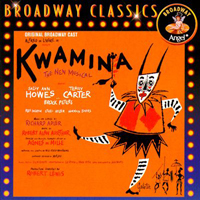 Original Broadway Cast, 1961 (Capitol/Angel)
Original Broadway Cast, 1961 (Capitol/Angel)  (4 / 5) So, which Broadway composer stretched himself the most in writing a score that no one would have guessed he had in him? Jerry Herman with Dear World? Good answer. Stephen Schwartz with The Baker’s Wife? Better answer. Richard Adler with Kwamina? Best answer! Adler, who had previously co-written two all-American musical comedy hits, The Pajama Game and Damn Yankees, here took on African tribal music and scored astonishingly well. The album starts off arrestingly with “The Cocoa Bean Song,” in which African laborers sing of their relationship to their crop: “One does the drinkin’, the other gets drunk.” “Nothing More to Look Forward To” has a glorious, Bantu-inspired melody, and it’s a shame that the Kingston Trio’s cover version wasn’t included as a bonus track on the CD edition of this recording. Both music and lyrics sparkle in “One Wife,” which gives us the tribe’s atypical views on monogamy, and “Something Big,” the African colony’s cry for independence from England. But — and a big but it is! — much of the show deals with two doctors, Kwamina (Terry Carter), an African educated in England, and Eve (Sally Ann Howes), a British woman. And, alas, most of their songs are routine. — Peter Filichia
(4 / 5) So, which Broadway composer stretched himself the most in writing a score that no one would have guessed he had in him? Jerry Herman with Dear World? Good answer. Stephen Schwartz with The Baker’s Wife? Better answer. Richard Adler with Kwamina? Best answer! Adler, who had previously co-written two all-American musical comedy hits, The Pajama Game and Damn Yankees, here took on African tribal music and scored astonishingly well. The album starts off arrestingly with “The Cocoa Bean Song,” in which African laborers sing of their relationship to their crop: “One does the drinkin’, the other gets drunk.” “Nothing More to Look Forward To” has a glorious, Bantu-inspired melody, and it’s a shame that the Kingston Trio’s cover version wasn’t included as a bonus track on the CD edition of this recording. Both music and lyrics sparkle in “One Wife,” which gives us the tribe’s atypical views on monogamy, and “Something Big,” the African colony’s cry for independence from England. But — and a big but it is! — much of the show deals with two doctors, Kwamina (Terry Carter), an African educated in England, and Eve (Sally Ann Howes), a British woman. And, alas, most of their songs are routine. — Peter Filichia
Kuni-Leml
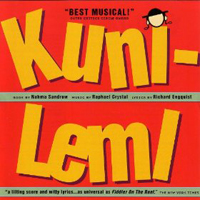 Off-Broadway Cast, 1998 (Slider Music)
Off-Broadway Cast, 1998 (Slider Music)  (2 / 5) Avrom Goldfadn’s Yiddish farce The Two Kuni-Lemls is all but forgotten today. Even so, New York’s Jewish Repertory Theatre (JRT) commissioned a musical version of it in 1984, and the result turned out to be a success. But it wasn’t until the JRT revived Kuni-Leml 14 years later that the musical was recorded. The album reveals this to be a charming show — no more, no less. Raphael Crystal’s music is bouncy and Richard Engquist’s lyrics are solid, but that’s pretty much the best that can be said for the score. The strength of the recording lies in the cast, headed by Danny Gurwin as the title character, a pious student who’s roped into marrying a rich man’s daughter; and Farah Alvin as a matchmaker’s daughter who’s unlucky in love. These two are hilarious in their solos, “What’s My Name?” and “Don’t Worry, Darling,” and delightful in their duet, “Do Horses Talk to Horses?” — so much so that they rise above the middling material. Paul Harman is suitably over-the-top as the boisterous matchmaker. David Wolfson leads a four-piece band through the nicely orchestrated score. — Seth Christenfeld
(2 / 5) Avrom Goldfadn’s Yiddish farce The Two Kuni-Lemls is all but forgotten today. Even so, New York’s Jewish Repertory Theatre (JRT) commissioned a musical version of it in 1984, and the result turned out to be a success. But it wasn’t until the JRT revived Kuni-Leml 14 years later that the musical was recorded. The album reveals this to be a charming show — no more, no less. Raphael Crystal’s music is bouncy and Richard Engquist’s lyrics are solid, but that’s pretty much the best that can be said for the score. The strength of the recording lies in the cast, headed by Danny Gurwin as the title character, a pious student who’s roped into marrying a rich man’s daughter; and Farah Alvin as a matchmaker’s daughter who’s unlucky in love. These two are hilarious in their solos, “What’s My Name?” and “Don’t Worry, Darling,” and delightful in their duet, “Do Horses Talk to Horses?” — so much so that they rise above the middling material. Paul Harman is suitably over-the-top as the boisterous matchmaker. David Wolfson leads a four-piece band through the nicely orchestrated score. — Seth Christenfeld
Knickerbocker Holiday
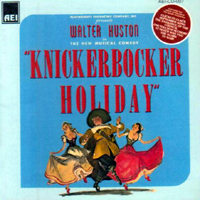 Original Broadway Cast, 1938 (Joey/AEI)
Original Broadway Cast, 1938 (Joey/AEI)  (3 / 5) Boiled-down radio broadcasts of Broadway musicals were not unheard of in the 1930s, and the few that have been released commercially in subsequent decades generally provide interesting, if scratchy, listening. This release of a 1938 broadcast of Knickerbocker Holiday with members of the original Broadway cast was especially valuable in its day, since for many years there was no other recording of Kurt Weill and Maxwell Anderson’s political satire; as a bonus, AEI’s CD also incorporates material from a 1945 radio version with a studio cast. The show spins a diverting yarn of old New Amsterdam and its autocratic mayor, Peter Stuyvesant, as filtered through the imagination of narrator Washington Irving, played by a young Ray Middleton. In the process, Anderson has fun with jokes about old New York and scores still-trenchant political points about media censorship and totalitarianism in democracy’s clothing. The best thing about this recording is that it preserves for posterity Walter Huston’s performance in his debut role in musical theater. Huston whispers “September Song” unforgettably, and makes every syllable count. His comic timing is also impeccable, even though he’s playing against the tepid Tina Tienhoven of Jeanne Madden. The bad news, aside from the decidedly dated sound, is the heavy editing of the musical program: Included here are just four complete songs and slivers of others, along with the briefest of overtures. At least the other principal ballad, the tender “It Never Was You,” gets a complete rendering by Madden and Richard Kollrnar. — Marc Miller
(3 / 5) Boiled-down radio broadcasts of Broadway musicals were not unheard of in the 1930s, and the few that have been released commercially in subsequent decades generally provide interesting, if scratchy, listening. This release of a 1938 broadcast of Knickerbocker Holiday with members of the original Broadway cast was especially valuable in its day, since for many years there was no other recording of Kurt Weill and Maxwell Anderson’s political satire; as a bonus, AEI’s CD also incorporates material from a 1945 radio version with a studio cast. The show spins a diverting yarn of old New Amsterdam and its autocratic mayor, Peter Stuyvesant, as filtered through the imagination of narrator Washington Irving, played by a young Ray Middleton. In the process, Anderson has fun with jokes about old New York and scores still-trenchant political points about media censorship and totalitarianism in democracy’s clothing. The best thing about this recording is that it preserves for posterity Walter Huston’s performance in his debut role in musical theater. Huston whispers “September Song” unforgettably, and makes every syllable count. His comic timing is also impeccable, even though he’s playing against the tepid Tina Tienhoven of Jeanne Madden. The bad news, aside from the decidedly dated sound, is the heavy editing of the musical program: Included here are just four complete songs and slivers of others, along with the briefest of overtures. At least the other principal ballad, the tender “It Never Was You,” gets a complete rendering by Madden and Richard Kollrnar. — Marc Miller
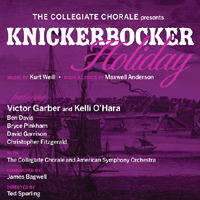 New York Concert Cast, 2011 (Ghostlight)
New York Concert Cast, 2011 (Ghostlight)  (4 / 5) Thanks to the Collegiate Chorale’s 2011 concert presentation with a notable group of celebrity guest artists, recorded live at Alice Tully Hall, we finally get to hear all of Knickerbocker Holiday. And what a strange score it turns out to be. Even as Weill’s trying to sound “Broadway,” his German roots are evident; such ballads as “Will You Remember Me?” and “We Are Cut in Twain” might have snuck in from Mahagonny or Threepenny. It’s a blaringly political piece, very anti-New Deal, and the authority-slapping “How Can You Tell an American?” could be an anthem for the Tea Party. Some of the score — “Our Ancient Liberties,” “Bachelor’s Song” — is actually dull. But Weill’s orchestrations, saxophone-heavy and liltingly conducted by James Bagwell, are characterful and graceful. Victor Garber is Peter Stuyvesant; consummate pro though he is, he isn’t Walter Huston, and his vigorously acted “September Song” lacks the easy charm of the original. Kelli O’Hara trills prettily and is well partnered by Ben Davis. Bryce Pinkham, David Garrison, Christopher Fitzgerald, and Brooks Ashmanskas fill out the cast in lesser roles. The audience sounds like it’s enjoying the show, and, occasional longueurs aside, so will you. — M.M.
(4 / 5) Thanks to the Collegiate Chorale’s 2011 concert presentation with a notable group of celebrity guest artists, recorded live at Alice Tully Hall, we finally get to hear all of Knickerbocker Holiday. And what a strange score it turns out to be. Even as Weill’s trying to sound “Broadway,” his German roots are evident; such ballads as “Will You Remember Me?” and “We Are Cut in Twain” might have snuck in from Mahagonny or Threepenny. It’s a blaringly political piece, very anti-New Deal, and the authority-slapping “How Can You Tell an American?” could be an anthem for the Tea Party. Some of the score — “Our Ancient Liberties,” “Bachelor’s Song” — is actually dull. But Weill’s orchestrations, saxophone-heavy and liltingly conducted by James Bagwell, are characterful and graceful. Victor Garber is Peter Stuyvesant; consummate pro though he is, he isn’t Walter Huston, and his vigorously acted “September Song” lacks the easy charm of the original. Kelli O’Hara trills prettily and is well partnered by Ben Davis. Bryce Pinkham, David Garrison, Christopher Fitzgerald, and Brooks Ashmanskas fill out the cast in lesser roles. The audience sounds like it’s enjoying the show, and, occasional longueurs aside, so will you. — M.M.
Kiss of the Spider Woman
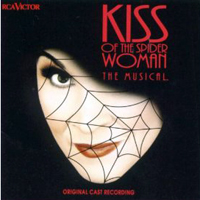 Original Toronto/London/Broadway Cast, 1992 (First Night)
Original Toronto/London/Broadway Cast, 1992 (First Night)  (5 / 5) Surely one of the most original and haunting musicals of the ’90s, Kiss of the Spider Woman is also one of the strangest and most surreal shows ever to enjoy a long Broadway run. Terrence McNally’s adaptation of Manuel Puig’s novel and film unfolds with the terrible logic of a dream. The action is set in a prison in an unnamed Latin American country: Brent Carver is Molina, a gay window dresser under arrest for having had sex with a minor; his cellmate is Valentin (Anthony Crivello), a fierce, homophobic revolutionary. Their relationship is complex, sexually charged, and fraught with ambiguity. Hovering over them both is Aurora, the film goddess of Molina’s fantasies, who is also the Spider Woman — the spirit of death — played by Chita Rivera. The drama moves in and out of the prison cell into a series of movie narratives, dreams, and memories that enmesh both men in a web of seduction, treachery, and death. The astonishingly rich score, by composer John Kander and lyricist Fred Ebb, captures every shifting mood and level of reality. “Dressing Them Up” and “I Draw the Line” establish the troubled Molina-Valentin relationship clearly. “Dear One” is a gorgeous quartet for the two men plus Molina’s mother (nice work by Merle Louise) and Valentin’s girlfriend. Marta (Kirsti Carnahan). Equally fine is the heartbreaking “You Could Never Shame Me,” also featuring Molina’s mother. There is room for wild movie parodies (“Gimme Love,” “Russian Movie/Good Times”) and such dark, surreal numbers as the “Morphine Tango.” On the minus side, the score is afflicted with an overblown anthem, “The Day After That.” Carver and Crivello are first-rate, but the miracle here is Rivera. She was a stunning presence in the show — alternately campy, sinister, maternal, and mysterious. On the recording, she’s particularly electrifying in “Where You Are,” a creepy yet hilarious portrait of the movies’ power to obliterate reality (brilliantly orchestrated by Michael Gibson). Rivera is also alluring and frightening in “I Do Miracles,” and commanding in the sinister title song. She, and this recording, are simply not to be missed. — David Barbour
(5 / 5) Surely one of the most original and haunting musicals of the ’90s, Kiss of the Spider Woman is also one of the strangest and most surreal shows ever to enjoy a long Broadway run. Terrence McNally’s adaptation of Manuel Puig’s novel and film unfolds with the terrible logic of a dream. The action is set in a prison in an unnamed Latin American country: Brent Carver is Molina, a gay window dresser under arrest for having had sex with a minor; his cellmate is Valentin (Anthony Crivello), a fierce, homophobic revolutionary. Their relationship is complex, sexually charged, and fraught with ambiguity. Hovering over them both is Aurora, the film goddess of Molina’s fantasies, who is also the Spider Woman — the spirit of death — played by Chita Rivera. The drama moves in and out of the prison cell into a series of movie narratives, dreams, and memories that enmesh both men in a web of seduction, treachery, and death. The astonishingly rich score, by composer John Kander and lyricist Fred Ebb, captures every shifting mood and level of reality. “Dressing Them Up” and “I Draw the Line” establish the troubled Molina-Valentin relationship clearly. “Dear One” is a gorgeous quartet for the two men plus Molina’s mother (nice work by Merle Louise) and Valentin’s girlfriend. Marta (Kirsti Carnahan). Equally fine is the heartbreaking “You Could Never Shame Me,” also featuring Molina’s mother. There is room for wild movie parodies (“Gimme Love,” “Russian Movie/Good Times”) and such dark, surreal numbers as the “Morphine Tango.” On the minus side, the score is afflicted with an overblown anthem, “The Day After That.” Carver and Crivello are first-rate, but the miracle here is Rivera. She was a stunning presence in the show — alternately campy, sinister, maternal, and mysterious. On the recording, she’s particularly electrifying in “Where You Are,” a creepy yet hilarious portrait of the movies’ power to obliterate reality (brilliantly orchestrated by Michael Gibson). Rivera is also alluring and frightening in “I Do Miracles,” and commanding in the sinister title song. She, and this recording, are simply not to be missed. — David Barbour
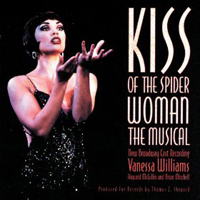 Broadway Cast, 1995 (Mercury)
Broadway Cast, 1995 (Mercury)  (3 / 5) Few replacement casts get their own cast albums, but Vanessa Williams was a popular recording artist when she went into Kiss of the Spider Woman as Aurora. Hence, this disc. Something is lost and something gained here. Williams’ singing is formidable, but her performance falls short. Aurora isn’t really a character; she’s an idea, a projection of Molina’s fantasies about the movies, his feelings about his mother, his fascination with death. Chita Rivera brought every watt of her star power to bear in the role, with memorable results; Williams simply doesn’t have the same overwhelming personality. On the other hand, Brian Stokes Mitchell is Valentin here, and the power of his voice is, as always, stupendous. He even makes something stirring out of “The Day After That.” As Molina, Howard McGillin is a little too leading mannish — Brent Carver was far closer to the desperately sad character envisioned by Terrence McNally and Manuel Puig — but his singing is beyond reproach. Don’t go out of your to way to find this recording, but if you’re a Williams fan, you’ll certainly enjoy it. — D.B.
(3 / 5) Few replacement casts get their own cast albums, but Vanessa Williams was a popular recording artist when she went into Kiss of the Spider Woman as Aurora. Hence, this disc. Something is lost and something gained here. Williams’ singing is formidable, but her performance falls short. Aurora isn’t really a character; she’s an idea, a projection of Molina’s fantasies about the movies, his feelings about his mother, his fascination with death. Chita Rivera brought every watt of her star power to bear in the role, with memorable results; Williams simply doesn’t have the same overwhelming personality. On the other hand, Brian Stokes Mitchell is Valentin here, and the power of his voice is, as always, stupendous. He even makes something stirring out of “The Day After That.” As Molina, Howard McGillin is a little too leading mannish — Brent Carver was far closer to the desperately sad character envisioned by Terrence McNally and Manuel Puig — but his singing is beyond reproach. Don’t go out of your to way to find this recording, but if you’re a Williams fan, you’ll certainly enjoy it. — D.B.
Kiss Me, Kate
 Original Broadway Cast, 1948 (Columbia/Sony)
Original Broadway Cast, 1948 (Columbia/Sony)  (5 / 5) Here is Cole Porter’s greatest score — fresh, groundbreaking, and oh, so naughty. The show’s book, by Bella and Sam Spewack, has a rousing backstage plot matched by a spirited play-within-the-play: Shakespeare’s The Taming of the Shrew, which turns up in excerpts here and there, giving the principals dual roles. As Fred/Petruchio and Lilli/Kate, the great stars Alfred Drake and Patricia Morison are at their professional peak on the cast album; they deliver every word distinctly, and caress every note. As Lois/Bianca, Lisa Kirk acts and sings her numbers impeccably; her performance of “Why Can’t You Behave?” is unsurpassed as her sultry voice pours over great lines such as, “There I’ll care for you forever / Well, at least till you dig my grave.” Porter’s raunchy lyrics for “Always True to You in My Fashion” are also meticulously rendered by Kirk. Harold Lang is on hand as Bill/Lucentio to sing the silly but charming “Bianca.” Pembroke Davenport conducts skillfully. Kiss Me, Kate contains several songs that have become famous: “So in Love,” “Wunderbar” “Another Op’nin’, Another Show,” “Too Darn Hot,” and one of the cleverest comedy numbers ever written for the stage, “Brush Up Your Shakespeare.” And let’s not forget the delightfully nasty “I Hate Men,” performed here by Patricia Morison as if she really means it. [Note: Kiss Me, Kate opened on December 30, 1948, but the cast recording was actually made in January 1949.] — Gerard Alessandrini
(5 / 5) Here is Cole Porter’s greatest score — fresh, groundbreaking, and oh, so naughty. The show’s book, by Bella and Sam Spewack, has a rousing backstage plot matched by a spirited play-within-the-play: Shakespeare’s The Taming of the Shrew, which turns up in excerpts here and there, giving the principals dual roles. As Fred/Petruchio and Lilli/Kate, the great stars Alfred Drake and Patricia Morison are at their professional peak on the cast album; they deliver every word distinctly, and caress every note. As Lois/Bianca, Lisa Kirk acts and sings her numbers impeccably; her performance of “Why Can’t You Behave?” is unsurpassed as her sultry voice pours over great lines such as, “There I’ll care for you forever / Well, at least till you dig my grave.” Porter’s raunchy lyrics for “Always True to You in My Fashion” are also meticulously rendered by Kirk. Harold Lang is on hand as Bill/Lucentio to sing the silly but charming “Bianca.” Pembroke Davenport conducts skillfully. Kiss Me, Kate contains several songs that have become famous: “So in Love,” “Wunderbar” “Another Op’nin’, Another Show,” “Too Darn Hot,” and one of the cleverest comedy numbers ever written for the stage, “Brush Up Your Shakespeare.” And let’s not forget the delightfully nasty “I Hate Men,” performed here by Patricia Morison as if she really means it. [Note: Kiss Me, Kate opened on December 30, 1948, but the cast recording was actually made in January 1949.] — Gerard Alessandrini
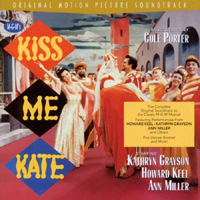 Film Soundtrack, 1953 (MGM/Rhino-Turner)
Film Soundtrack, 1953 (MGM/Rhino-Turner)  (5 / 5) MGM gave Kiss Me, Kate the royal treatment. The soundtrack is thrilling, even if this is more a flashy movie musical than a faithful transfer of the stage show. As Fred/Petruchio, Howard Keel sings with bravura. Katherine Grayson as Lilli/Kate is less satisfying; her vocal trills are pretty, but she doesn’t have the acting or belting chops for “I Hate Men.” The cast member who shines the brightest here is Ann Miller as Lois/Bianca. Besides being a great dancer, Miller was also a fine singer, and her brassy renditions of “Always True to You in My Fashion” and “Too Darn Hot” are terrific. Another delight is the musical scoring by Saul Chaplin and André Previn. Although the treatment is as Hollywoodish as can be, Porter’s splendid melodies and urbane lyrics shine through. The stage score was transferred to the screen almost in its entirety; “Another Op’nin’, Another Show” and “Bianca” were dropped (parts of both are still heard as background music), but another great Porter song was added, “From This Moment On.” That track alone is worth the price of the soundtrack recording, but Rhino’s expanded CD includes the entire film score in glorious early stereo. — G.A.
(5 / 5) MGM gave Kiss Me, Kate the royal treatment. The soundtrack is thrilling, even if this is more a flashy movie musical than a faithful transfer of the stage show. As Fred/Petruchio, Howard Keel sings with bravura. Katherine Grayson as Lilli/Kate is less satisfying; her vocal trills are pretty, but she doesn’t have the acting or belting chops for “I Hate Men.” The cast member who shines the brightest here is Ann Miller as Lois/Bianca. Besides being a great dancer, Miller was also a fine singer, and her brassy renditions of “Always True to You in My Fashion” and “Too Darn Hot” are terrific. Another delight is the musical scoring by Saul Chaplin and André Previn. Although the treatment is as Hollywoodish as can be, Porter’s splendid melodies and urbane lyrics shine through. The stage score was transferred to the screen almost in its entirety; “Another Op’nin’, Another Show” and “Bianca” were dropped (parts of both are still heard as background music), but another great Porter song was added, “From This Moment On.” That track alone is worth the price of the soundtrack recording, but Rhino’s expanded CD includes the entire film score in glorious early stereo. — G.A.
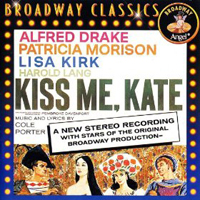 Studio Cast, 1959 (Capitol/Angel)
Studio Cast, 1959 (Capitol/Angel)  (5 / 5) In many ways, this recording is nearly identical to the original cast album made 10 years earlier, the only major difference being that this version is in stereo. The stars of Kiss Me, Kate reunited to re-record the score in state-of-the-art, “Full Dimensional Stereo” soon after the airing of a CBS-TV version of the musical that starred Alfred Drake and Patricia Morison. The telecast featured Bill Hayes as Bill! Lucentio and Julie Wilson as Lois/Bianca, but this studio cast recording brought back Lisa Kirk and Harold Lang, along with the Broadway conductor, Pembroke Davenport. All of the performances are as fresh and vibrant as on the original album; except for the improved sound quality, it’s sometimes hard to tell one version from the other. But the orchestra seems augmented a bit here, and original cast member Lorenzo Fuller as Paul the valet gets to lead “Another Op’nin’, Another Show” in addition to “Too Darn Hot.” P.S.: The show’s gangster roles are sung by Aloysius Donovan and Alexis Dubroff, both a.k.a. Alfred Drake! — G.A.
(5 / 5) In many ways, this recording is nearly identical to the original cast album made 10 years earlier, the only major difference being that this version is in stereo. The stars of Kiss Me, Kate reunited to re-record the score in state-of-the-art, “Full Dimensional Stereo” soon after the airing of a CBS-TV version of the musical that starred Alfred Drake and Patricia Morison. The telecast featured Bill Hayes as Bill! Lucentio and Julie Wilson as Lois/Bianca, but this studio cast recording brought back Lisa Kirk and Harold Lang, along with the Broadway conductor, Pembroke Davenport. All of the performances are as fresh and vibrant as on the original album; except for the improved sound quality, it’s sometimes hard to tell one version from the other. But the orchestra seems augmented a bit here, and original cast member Lorenzo Fuller as Paul the valet gets to lead “Another Op’nin’, Another Show” in addition to “Too Darn Hot.” P.S.: The show’s gangster roles are sung by Aloysius Donovan and Alexis Dubroff, both a.k.a. Alfred Drake! — G.A.
 Television Cast, 1968 (Columbia Special Products/Sony)
Television Cast, 1968 (Columbia Special Products/Sony)  (2 / 5) As is also true of the television cast recording of Brigadoon starring Robert Goulet, the arrangements, orchestrations, and keys of the songs as presented here make this item sound more like a pop record than a Kiss Me, Kate cast album. That’s most unfortunate in two cuts, “I Hate Men” and “Always True to You In My Fashion,” both given “swinging ’60s” arrangements. But again, the leads — here, Goulet as Fred/Petruchio and his then-wife, Carol Lawrence, as Lili/Kate — were Broadway musical theater stars of their day. It’s nice to hear their voices in these roles, but would have been even nicer if Cole Porter’s great score had been given a more traditional reading. Also on hand is Michael Callan, who played Riff in the OBC of West Side Story, as Bill/Lucentio; the one stinker song in the score, “Bianca,” is nowhere to be heard here, but Callan has been compensated with “Too Darn Hot,” not originally Bill’s number. Jessica Walter does a fine job with Lois/Bianca’s musical moments (even “Always True to You in My Fashion,” despite that tacky rearrangement), and Jules Munshin and Marty Ingels are amusing as the gangsters in “Brush Up Your Shakespeare.” Sharp-eared listeners will note that a few of Porter’s lyrics for some of these songs were rewritten for this TV adaptation, for whatever reason. {Note: Sony’s CD edition of the recording is packaged on a single disc with the 1966 Brigadoon TV cast album referenced above.] — Michael Portantiere
(2 / 5) As is also true of the television cast recording of Brigadoon starring Robert Goulet, the arrangements, orchestrations, and keys of the songs as presented here make this item sound more like a pop record than a Kiss Me, Kate cast album. That’s most unfortunate in two cuts, “I Hate Men” and “Always True to You In My Fashion,” both given “swinging ’60s” arrangements. But again, the leads — here, Goulet as Fred/Petruchio and his then-wife, Carol Lawrence, as Lili/Kate — were Broadway musical theater stars of their day. It’s nice to hear their voices in these roles, but would have been even nicer if Cole Porter’s great score had been given a more traditional reading. Also on hand is Michael Callan, who played Riff in the OBC of West Side Story, as Bill/Lucentio; the one stinker song in the score, “Bianca,” is nowhere to be heard here, but Callan has been compensated with “Too Darn Hot,” not originally Bill’s number. Jessica Walter does a fine job with Lois/Bianca’s musical moments (even “Always True to You in My Fashion,” despite that tacky rearrangement), and Jules Munshin and Marty Ingels are amusing as the gangsters in “Brush Up Your Shakespeare.” Sharp-eared listeners will note that a few of Porter’s lyrics for some of these songs were rewritten for this TV adaptation, for whatever reason. {Note: Sony’s CD edition of the recording is packaged on a single disc with the 1966 Brigadoon TV cast album referenced above.] — Michael Portantiere
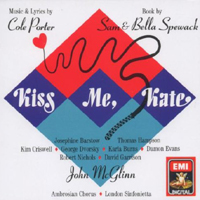 Studio Cast, 1990 (Angel)
Studio Cast, 1990 (Angel)  (3 / 5) Conductor John McGlinn spearheaded this recording of Kiss Me, Kate, starring Josephine Barstow and Thomas Hampson in an edition that’s less effective than other recorded performances of this great show. Still, it was an important aural document when it appeared in 1990, because of its completeness. In addition to the original overture, the album offers every verse of every song and fully orchestrated versions of songs dropped from the show before it opened, plus an excellent booklet filled with background information. Hampson and Barstow are magnificent opera singers, but a Cole Porter score needs performers with a more theatrical edge. Kim Criswell is also a wonderful talent, but is miscast as Lois/Bianca. George Dvorsky, David Garrison, and Davis Gaines are effective in their roles. On the whole, this recording sounds somewhat cold, and it ultimately short changes the jazzier, wittier aspects of the score. — G.A.
(3 / 5) Conductor John McGlinn spearheaded this recording of Kiss Me, Kate, starring Josephine Barstow and Thomas Hampson in an edition that’s less effective than other recorded performances of this great show. Still, it was an important aural document when it appeared in 1990, because of its completeness. In addition to the original overture, the album offers every verse of every song and fully orchestrated versions of songs dropped from the show before it opened, plus an excellent booklet filled with background information. Hampson and Barstow are magnificent opera singers, but a Cole Porter score needs performers with a more theatrical edge. Kim Criswell is also a wonderful talent, but is miscast as Lois/Bianca. George Dvorsky, David Garrison, and Davis Gaines are effective in their roles. On the whole, this recording sounds somewhat cold, and it ultimately short changes the jazzier, wittier aspects of the score. — G.A.
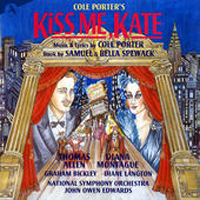 Studio Cast, 1996 (JAY, 2CDs)
Studio Cast, 1996 (JAY, 2CDs)  (4 / 5) Here’s another complete recording of the score. Thomas Allen and Diana Montague are well cast as Fred/Petruchio and Lilli/Kate, with beautiful voices that never overpower the songs and acting that suits the material nicely. Diane Langton as Lois/Bianca is somewhat less effective vocally and comically, but Graham Bickley as Bill!Lucentio is quite appealing. The score is excitingly conducted by john Owen Edwards; his tempi are bright and bouncy, and the orchestra sounds full and lush. The complete, original Robert Russell Bennett orchestrations are heard in all of the jazzy dance numbers, the overture, and the entr’acte, plus the scene-change music and underscoring. This two-disc set also contains bonus tracks of the overtures to Porter’s Can-Can, Jubilee, and Out of This World. — G.A.
(4 / 5) Here’s another complete recording of the score. Thomas Allen and Diana Montague are well cast as Fred/Petruchio and Lilli/Kate, with beautiful voices that never overpower the songs and acting that suits the material nicely. Diane Langton as Lois/Bianca is somewhat less effective vocally and comically, but Graham Bickley as Bill!Lucentio is quite appealing. The score is excitingly conducted by john Owen Edwards; his tempi are bright and bouncy, and the orchestra sounds full and lush. The complete, original Robert Russell Bennett orchestrations are heard in all of the jazzy dance numbers, the overture, and the entr’acte, plus the scene-change music and underscoring. This two-disc set also contains bonus tracks of the overtures to Porter’s Can-Can, Jubilee, and Out of This World. — G.A.
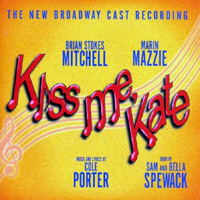 Broadway Cast, 2000 (DRG)
Broadway Cast, 2000 (DRG)  (4 / 5) The stellar performances of Brian Stokes Mitchell and Marin Mazzie help to make this a delightful cast album. Although the score was re-orchestrated for a smaller number of instruments, Cole Porter’s music still sounds great, and this Broadway revival proved that the story and songs hadn’t aged a bit. Mazzie’s rendition of Lilli’s “So in Love” is a particular standout as she captures all of the angst and passion inherent in one of Porter’s greatest love songs. Mitchell does an especially fine job with Fred’s/Petruchio’s numbers; his rendition of “Were Thine That Special Face” is at once poignant and thrilling. On the comedy side, Mazzie takes the honors with a wonderfully overwrought version of Kate’s “I Hate Men.” Amy Spanger and Michael Berresse are somewhat less effective as Lois/Bianca and Bill/Lucentio on this recording than they were onstage, but the entire cast, including Michael Mulheren and Lee Wilkof as the gangsters, performs with great vigor. If you’re looking for an excellent contemporary interpretation of this timeless show, look no further. — G.A.
(4 / 5) The stellar performances of Brian Stokes Mitchell and Marin Mazzie help to make this a delightful cast album. Although the score was re-orchestrated for a smaller number of instruments, Cole Porter’s music still sounds great, and this Broadway revival proved that the story and songs hadn’t aged a bit. Mazzie’s rendition of Lilli’s “So in Love” is a particular standout as she captures all of the angst and passion inherent in one of Porter’s greatest love songs. Mitchell does an especially fine job with Fred’s/Petruchio’s numbers; his rendition of “Were Thine That Special Face” is at once poignant and thrilling. On the comedy side, Mazzie takes the honors with a wonderfully overwrought version of Kate’s “I Hate Men.” Amy Spanger and Michael Berresse are somewhat less effective as Lois/Bianca and Bill/Lucentio on this recording than they were onstage, but the entire cast, including Michael Mulheren and Lee Wilkof as the gangsters, performs with great vigor. If you’re looking for an excellent contemporary interpretation of this timeless show, look no further. — G.A.
Kismet
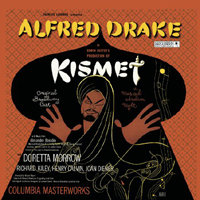 Original Broadway Cast, 1953 (Columbia/Sony)
Original Broadway Cast, 1953 (Columbia/Sony)  (5 / 5) Based on music by the Russian composer Alexander Borodin, this is the classic Arabian Nights musical. Starring the magnificent Alfred Drake as Hajj the poet, Kismet is one of the greatest cast albums ever recorded — unsurpassed and indispensable. The show is a poetic fantasy about fate, an almost operatic treatment of the belief that a man can control his own destiny through industry and wit. Drake is at the height of his powers here, his every moment of brio, wisdom, and romantic musicality bursting from this excellent-sounding monophonic recording. Seldom has a score been as well conducted as this one is by Louis Adrian. Drake’s exceptional performance is ably supported by Richard Kiley as the Caliph, with his rich, sexy baritone voice. Soprano Doretta Morrow is lovely in “Baubles, Bangles, and Beads,” “And This Is My Beloved,” and Marsinah’s other musical moments. The amazing Joan Diener is on hand to hit Lalume’s numbers out of the park; her vocal gymnastics in “Not Since Nineveh” still can make jaws drop. And Henry Calvin is powerful in “Was I Wazir.” Through the genius of Robert Wright and George Forrest, Borodin’s melodies have been transformed into great musical theater songs. The team’s lyrics still crackle with the intelligence, wit, and craft of a Cole Porter or Stephen Sondheim. The few melodies that Wright and Forrest created from scratch, such as “Rahadlakum” and the bridge to “Stranger in Paradise,” are so excellent and so authentic-sounding that they combine seamlessly with the Borodin music. — Gerard Alessandrini
(5 / 5) Based on music by the Russian composer Alexander Borodin, this is the classic Arabian Nights musical. Starring the magnificent Alfred Drake as Hajj the poet, Kismet is one of the greatest cast albums ever recorded — unsurpassed and indispensable. The show is a poetic fantasy about fate, an almost operatic treatment of the belief that a man can control his own destiny through industry and wit. Drake is at the height of his powers here, his every moment of brio, wisdom, and romantic musicality bursting from this excellent-sounding monophonic recording. Seldom has a score been as well conducted as this one is by Louis Adrian. Drake’s exceptional performance is ably supported by Richard Kiley as the Caliph, with his rich, sexy baritone voice. Soprano Doretta Morrow is lovely in “Baubles, Bangles, and Beads,” “And This Is My Beloved,” and Marsinah’s other musical moments. The amazing Joan Diener is on hand to hit Lalume’s numbers out of the park; her vocal gymnastics in “Not Since Nineveh” still can make jaws drop. And Henry Calvin is powerful in “Was I Wazir.” Through the genius of Robert Wright and George Forrest, Borodin’s melodies have been transformed into great musical theater songs. The team’s lyrics still crackle with the intelligence, wit, and craft of a Cole Porter or Stephen Sondheim. The few melodies that Wright and Forrest created from scratch, such as “Rahadlakum” and the bridge to “Stranger in Paradise,” are so excellent and so authentic-sounding that they combine seamlessly with the Borodin music. — Gerard Alessandrini
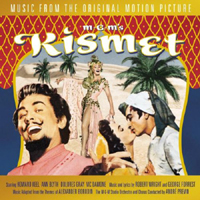 Film Soundtrack, 1955 (MGM/Rhino-Turner)
Film Soundtrack, 1955 (MGM/Rhino-Turner)  (4 / 5) When the movie version of Kismet hit the Cinemascope screen, the results were pallid compared with the spectacular stage production, but the film soundtrack is a triumph. The music is conducted by the young André Previn, who during his singular career was noted as a symphony orchestra conductor, composer, pianist, etc. Having already musically supervised several MGM films, Previn knew how to enhance the glitzy elements of the Kismet score. Rhino’s expanded soundtrack CD is a fabulous treat. It even includes “Rhymes Have I,” recorded by Howard Keel and Ann Blyth but deleted from the film, along with the reprise of “Fate” and the “Dance of the Three Princess of Ababu.” Keel and Blyth are nearly as good as Alfred Drake and Doretta Morrow on the Broadway cast album, while Dolores Gray surpasses all other Lalumes; she brings tremendous color and vivacity to “Not Since Nineveh,” and her delivery of the song “Bored” (which was not in the Broadway show) is smooth and sensual. Gray’s chemistry with Keel is titillating, and their “Rahadlakum” duet is wonderfully erotic. The only disappointing selection on this recording is the score’s most famous song, “Stranger in Paradise.” It’s conducted at a very slow tempo, and Vic Damone as the Caliph croons and slides through this operatic ballad as though he’s singing in a wee-hours piano bar. Furthermore, when Blyth joins Damone for the second chorus, she sounds precious and stilted. Even the arrangement of the number is lethargic. But, other than this one misguided performance, the soundtrack is highly recommended as a companion to the original Broadway recording. — G.A.
(4 / 5) When the movie version of Kismet hit the Cinemascope screen, the results were pallid compared with the spectacular stage production, but the film soundtrack is a triumph. The music is conducted by the young André Previn, who during his singular career was noted as a symphony orchestra conductor, composer, pianist, etc. Having already musically supervised several MGM films, Previn knew how to enhance the glitzy elements of the Kismet score. Rhino’s expanded soundtrack CD is a fabulous treat. It even includes “Rhymes Have I,” recorded by Howard Keel and Ann Blyth but deleted from the film, along with the reprise of “Fate” and the “Dance of the Three Princess of Ababu.” Keel and Blyth are nearly as good as Alfred Drake and Doretta Morrow on the Broadway cast album, while Dolores Gray surpasses all other Lalumes; she brings tremendous color and vivacity to “Not Since Nineveh,” and her delivery of the song “Bored” (which was not in the Broadway show) is smooth and sensual. Gray’s chemistry with Keel is titillating, and their “Rahadlakum” duet is wonderfully erotic. The only disappointing selection on this recording is the score’s most famous song, “Stranger in Paradise.” It’s conducted at a very slow tempo, and Vic Damone as the Caliph croons and slides through this operatic ballad as though he’s singing in a wee-hours piano bar. Furthermore, when Blyth joins Damone for the second chorus, she sounds precious and stilted. Even the arrangement of the number is lethargic. But, other than this one misguided performance, the soundtrack is highly recommended as a companion to the original Broadway recording. — G.A.
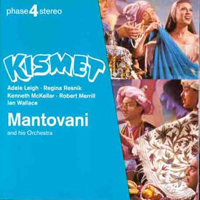 Studio Cast, 1963 (London)
Studio Cast, 1963 (London)  (4 / 5) The popular conductor Mantovani received top billing when this album was released, but he isn’t the only star here. Opera great Robert Merrill sings Hajj to great effect, and diva Regina Resnik is Lalume. This Kismet has a very “classical” sound, yet the nuances of musical comedy are intact, as the performance captures both the lyrical and showbiz glitz elements of the show. Merrill handles the big baritone passages and witty patter songs of his role equally well; next to Alfred Drake, he’s the best Hajj on records. Resnik’s “Not Since Nineveh” may be a bit high-toned, but she is nonetheless sexy and fun. Adele Leigh and Kenneth McKellar show off their lovely, operetta-style voices in “Stranger in Paradise” and “This Is My Beloved.” This was the first stereo recording of Kismet to be commercially released, and it definitely measures up to more recent digital recordings of the score. — G.A.
(4 / 5) The popular conductor Mantovani received top billing when this album was released, but he isn’t the only star here. Opera great Robert Merrill sings Hajj to great effect, and diva Regina Resnik is Lalume. This Kismet has a very “classical” sound, yet the nuances of musical comedy are intact, as the performance captures both the lyrical and showbiz glitz elements of the show. Merrill handles the big baritone passages and witty patter songs of his role equally well; next to Alfred Drake, he’s the best Hajj on records. Resnik’s “Not Since Nineveh” may be a bit high-toned, but she is nonetheless sexy and fun. Adele Leigh and Kenneth McKellar show off their lovely, operetta-style voices in “Stranger in Paradise” and “This Is My Beloved.” This was the first stereo recording of Kismet to be commercially released, and it definitely measures up to more recent digital recordings of the score. — G.A.
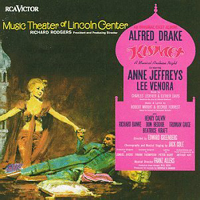 Music Theater of Lincoln Center Cast, 1965 (RCA)
Music Theater of Lincoln Center Cast, 1965 (RCA)  (4 / 5) Recorded in beautiful stereo, this Kismet boasts the show’s original star, Alfred Drake. It’s a joy to hear him recreate his most colorful role, and the elapsed years only add further expertise to his performance. One difference between this recording and the 1953 Broadway album is that the thrilling overture has been replaced by a watered-down section of Borodin’s “Polovtsian Dances.” Still, Franz Allers’ conducting certainly has musical expertise. Most of the supporting cast is excellent, particularly Lee Venora as Marsinah. Anne Jeffreys, a major musical theater talent who rarely had the good fortune to be recorded, is Lalume; although not as witty as Joan Diener in the role, she has a versatile voice, and she gets to sing the sensual “Bored.” As for the Caliph, Richard Banke displays a wonderful tenor in his renditions of “Stranger in Paradise” and “Night of My Nights.” On the whole, this is a more intimate statement of the score than the original cast album and is fine as a second choice for your collection. — G.A.
(4 / 5) Recorded in beautiful stereo, this Kismet boasts the show’s original star, Alfred Drake. It’s a joy to hear him recreate his most colorful role, and the elapsed years only add further expertise to his performance. One difference between this recording and the 1953 Broadway album is that the thrilling overture has been replaced by a watered-down section of Borodin’s “Polovtsian Dances.” Still, Franz Allers’ conducting certainly has musical expertise. Most of the supporting cast is excellent, particularly Lee Venora as Marsinah. Anne Jeffreys, a major musical theater talent who rarely had the good fortune to be recorded, is Lalume; although not as witty as Joan Diener in the role, she has a versatile voice, and she gets to sing the sensual “Bored.” As for the Caliph, Richard Banke displays a wonderful tenor in his renditions of “Stranger in Paradise” and “Night of My Nights.” On the whole, this is a more intimate statement of the score than the original cast album and is fine as a second choice for your collection. — G.A.
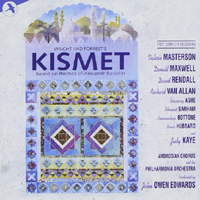 Studio Cast, 1989 (JAY, 2CDs)
Studio Cast, 1989 (JAY, 2CDs)  (2 / 5) This is a nearly-complete British studio recording of Kismet. Although parts of the score may benefit from a semi-operatic interpretation of the Borodin melodies, the performance is stodgy and lacks presence. The brassy Broadway elements of the score are sabotaged and, as a result, those sections simply seem old-fashioned. The usually wonderful Judy Kaye displays a certain amount of showbiz flamboyance as Lalume, but even she sounds too cautious. Donald Maxwell, Valerie Masterson, and especially David Rendall are first-rate singers, yet they all sound too stuffy for the score’s witty numbers and sensually romantic ballads. The fabulously talented Rosemary Ashe is fine in the small role of Ayah, momentarily bringing the proceedings to life. John Owen Edwards’ conducting is rather sloppy and never bouncy. The only real recommendation of this recording is the inclusion of five Wright-Forrest songs from Timbuktu, a 1979 rewrite of Kismet. Also included is “Bored” from the film version, here sung by Judy Kaye. — G.A.
(2 / 5) This is a nearly-complete British studio recording of Kismet. Although parts of the score may benefit from a semi-operatic interpretation of the Borodin melodies, the performance is stodgy and lacks presence. The brassy Broadway elements of the score are sabotaged and, as a result, those sections simply seem old-fashioned. The usually wonderful Judy Kaye displays a certain amount of showbiz flamboyance as Lalume, but even she sounds too cautious. Donald Maxwell, Valerie Masterson, and especially David Rendall are first-rate singers, yet they all sound too stuffy for the score’s witty numbers and sensually romantic ballads. The fabulously talented Rosemary Ashe is fine in the small role of Ayah, momentarily bringing the proceedings to life. John Owen Edwards’ conducting is rather sloppy and never bouncy. The only real recommendation of this recording is the inclusion of five Wright-Forrest songs from Timbuktu, a 1979 rewrite of Kismet. Also included is “Bored” from the film version, here sung by Judy Kaye. — G.A.
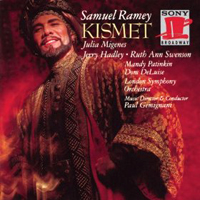 Studio Cast, 1991 (Sony)
Studio Cast, 1991 (Sony)  (3 / 5) The colorful, vocally demanding role of Hajj the poet is taken here by opera star Samuel Ramey. His expansive bass sounds thrilling in “Fate,” “The Olive Tree,” and the rest of Kismet‘s more legit-type numbers, but his stalwart style leaves something to be desired in such lighter songs as “Rhymes Have I” and “Gesticulate.” On the other hand, Julia Migenes is equally at home in opera and musical theater; her performance as Lalume is vocally spectacular and loaded with sex appeal. Jerry Hadley, as the Caliph, has a magnificent voice, but his interpretations of “Stranger in Paradise” and “Night of My Nights” are more stilted than romantic. Ruth Ann Swenson is far more successful as Marsinah; her gorgeous rendition of “Baubles, Bangles, and Beads” is a highlight of the disc. Dom DeLuise is an amusing Wazir, and Mandy Patinkin does a weird cameo as the “Marriage Arranger,” singing his number in falsetto. Broadway veteran Paul Gemignani conducts expertly. — G.A.
(3 / 5) The colorful, vocally demanding role of Hajj the poet is taken here by opera star Samuel Ramey. His expansive bass sounds thrilling in “Fate,” “The Olive Tree,” and the rest of Kismet‘s more legit-type numbers, but his stalwart style leaves something to be desired in such lighter songs as “Rhymes Have I” and “Gesticulate.” On the other hand, Julia Migenes is equally at home in opera and musical theater; her performance as Lalume is vocally spectacular and loaded with sex appeal. Jerry Hadley, as the Caliph, has a magnificent voice, but his interpretations of “Stranger in Paradise” and “Night of My Nights” are more stilted than romantic. Ruth Ann Swenson is far more successful as Marsinah; her gorgeous rendition of “Baubles, Bangles, and Beads” is a highlight of the disc. Dom DeLuise is an amusing Wazir, and Mandy Patinkin does a weird cameo as the “Marriage Arranger,” singing his number in falsetto. Broadway veteran Paul Gemignani conducts expertly. — G.A.
King of Hearts
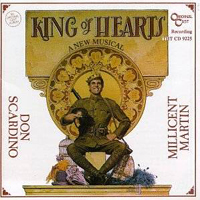 Original Broadway Cast, 1978 (Original Cast Records)
Original Broadway Cast, 1978 (Original Cast Records)  (1 / 5) When the charming film King of Hearts, a cult hit of the 1970s, was adapted as a big Broadway musical, it curled up and died. Don Scardino starred as Johnny, a young American soldier in World War I. Sent to a French village in search of a time bomb, Johnny doesn’t know that all the townspeople have evacuated and the folks he encounters are actually the escaped
(1 / 5) When the charming film King of Hearts, a cult hit of the 1970s, was adapted as a big Broadway musical, it curled up and died. Don Scardino starred as Johnny, a young American soldier in World War I. Sent to a French village in search of a time bomb, Johnny doesn’t know that all the townspeople have evacuated and the folks he encounters are actually the escaped
inmates of the local lunatic asylum. The story is afflicted with the ridiculous notion that crazy people are beautiful visionaries, while the score lacks dramatic punch and variety. For the recording, composer Peter Link replaced the original Broadway orchestrations with more intimate arrangements that make the whole thing sound like a collection of cutouts from French cabaret albums. Jacob Brackman’s lyrics are okay, but the score is too weak to make any of the songs special, although Scardino’s sweet rendition of “Close Upon This Hour” does have a nice folk-pop quality. Also on hand are Millicent Martin as one of those soulful European madams, Pamela Blair as a virginal prostitute, and Bob Gunton as a circus master. It all begins pleasantly enough, but everything sounds alike, and the recording sounds like a demo. — David Barbour
The King and I
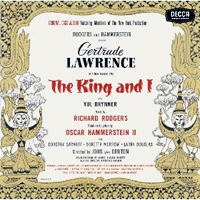 Original Broadway Cast, 1951 (Decca)
Original Broadway Cast, 1951 (Decca)  (3 / 5) Although the quality of Gertrude Lawrence’s singing as Anna Leonowens in Rodgers and Hammerstein’s The King and I was widely criticized, the effectiveness of her performance onstage was never questioned. While listeners may find the star’s vocal quality somewhat quivery here, the charm and drama she brings to such now classic songs as “I Whistle a Happy Tune,” “Hello, Young Lovers,” “Getting to Know You,” and “Shall We Dance?” gives substance to the superlatives that are still thrown around regarding her performance. Owing to space limitations on LPs of the 1950s, this recording has no dialogue lead-ins, little internal dialogue, and edits in many songs, while the “Small House of Uncle Thomas” ballet and “Western People Funny” numbers are cut entirely. The exquisite Doretta Morrow as Tuptim wins the vocal prize with her solo “My Lord and Master” and her two duets with the stalwart but very American-sounding Lun Tha of baritone Larry Douglas. Dorothy Sarnoff is wonderfully dignified in her rendition of “Something Wonderful,” and Yul Brynner’s first recording of “A Puzzlement” is essential, even though abridged. The sound quality of the recording was improved through remastering for digital media, and the preservation of the songs as originally performed, orchestrated by Robert Russell Bennett, and conducted by Frederick Dvonch shows this score to be a masterwork. Though subsequent recordings of The King and I are far more complete and offer better sound, it would be a mistake to overlook this album. — Jeffrey Dunn
(3 / 5) Although the quality of Gertrude Lawrence’s singing as Anna Leonowens in Rodgers and Hammerstein’s The King and I was widely criticized, the effectiveness of her performance onstage was never questioned. While listeners may find the star’s vocal quality somewhat quivery here, the charm and drama she brings to such now classic songs as “I Whistle a Happy Tune,” “Hello, Young Lovers,” “Getting to Know You,” and “Shall We Dance?” gives substance to the superlatives that are still thrown around regarding her performance. Owing to space limitations on LPs of the 1950s, this recording has no dialogue lead-ins, little internal dialogue, and edits in many songs, while the “Small House of Uncle Thomas” ballet and “Western People Funny” numbers are cut entirely. The exquisite Doretta Morrow as Tuptim wins the vocal prize with her solo “My Lord and Master” and her two duets with the stalwart but very American-sounding Lun Tha of baritone Larry Douglas. Dorothy Sarnoff is wonderfully dignified in her rendition of “Something Wonderful,” and Yul Brynner’s first recording of “A Puzzlement” is essential, even though abridged. The sound quality of the recording was improved through remastering for digital media, and the preservation of the songs as originally performed, orchestrated by Robert Russell Bennett, and conducted by Frederick Dvonch shows this score to be a masterwork. Though subsequent recordings of The King and I are far more complete and offer better sound, it would be a mistake to overlook this album. — Jeffrey Dunn
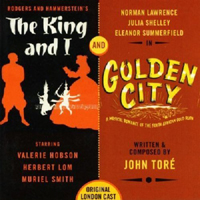 Original London Cast, 1953 (Philips/Sepia)
Original London Cast, 1953 (Philips/Sepia)  (1 / 5) Listening to Valerie Hobson as Anna, we can only wonder why, when so many people had issues with Gertrude Lawrence’s singing in the Broadway production, a stronger vocalist was not engaged for the role in London. Hobson has charm but fails to soar in her songs, except when she duets with Herbert Lom in “Shall We Dance?” Lom’s “A Puzzlement” is even further abridged than Yul Brynner’s on the original Broadway album, and not nearly as interesting. As Tuptim and Lun Tha, Doreen Duke and Jan Mazarus are generically legit singers. The only performance that rises above the level of “adequate” is Muriel Smith’s “Something Wonderful.” The Sepia CD is filled out with songs from two British musicals, Golden City and Bet Your Life. — J.D.
(1 / 5) Listening to Valerie Hobson as Anna, we can only wonder why, when so many people had issues with Gertrude Lawrence’s singing in the Broadway production, a stronger vocalist was not engaged for the role in London. Hobson has charm but fails to soar in her songs, except when she duets with Herbert Lom in “Shall We Dance?” Lom’s “A Puzzlement” is even further abridged than Yul Brynner’s on the original Broadway album, and not nearly as interesting. As Tuptim and Lun Tha, Doreen Duke and Jan Mazarus are generically legit singers. The only performance that rises above the level of “adequate” is Muriel Smith’s “Something Wonderful.” The Sepia CD is filled out with songs from two British musicals, Golden City and Bet Your Life. — J.D.
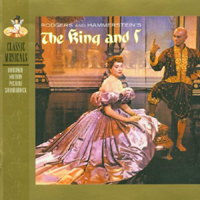 Film Soundtrack, 1956 (Capitol/Angel)
Film Soundtrack, 1956 (Capitol/Angel)  (4 / 5) One of the best stage-to-screen adaptations, the film version of The King and I is largely responsible for the musical’s enduring popularity. To begin with, it captured Yul Brynner’s performance for posterity, and Marni Nixon’s gorgeous vocal dubbing for Deborah Kerr is uncannily perfect. The soundtrack recording contains three songs that are not in the film — “My Lord and Master,” “I Have Dreamed,” “Shall I Tell What I Think of You?” — and the audio portion of the “Small House of Uncle Thomas” ballet, performed almost complete in the film, is also included on the expanded version of the album. Orchestrations are credited to Robert Russell Bennett plus three others; supervised by musical directors Alfred Newman and Ken Darby, these orchestrations provide a majestic sound. Terry Saunders (LadyThiang) does her own fine singing, while Rita Moreno (Tuptim) and Carlos Rivas (Lun Tha) are respectively dubbed by Leona Gordon and Reuben Fuentes. — J.D.
(4 / 5) One of the best stage-to-screen adaptations, the film version of The King and I is largely responsible for the musical’s enduring popularity. To begin with, it captured Yul Brynner’s performance for posterity, and Marni Nixon’s gorgeous vocal dubbing for Deborah Kerr is uncannily perfect. The soundtrack recording contains three songs that are not in the film — “My Lord and Master,” “I Have Dreamed,” “Shall I Tell What I Think of You?” — and the audio portion of the “Small House of Uncle Thomas” ballet, performed almost complete in the film, is also included on the expanded version of the album. Orchestrations are credited to Robert Russell Bennett plus three others; supervised by musical directors Alfred Newman and Ken Darby, these orchestrations provide a majestic sound. Terry Saunders (LadyThiang) does her own fine singing, while Rita Moreno (Tuptim) and Carlos Rivas (Lun Tha) are respectively dubbed by Leona Gordon and Reuben Fuentes. — J.D.
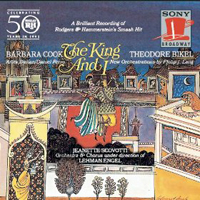 Studio Cast, 1964 (Columbia/Sony)
Studio Cast, 1964 (Columbia/Sony)  (3 / 5) Unfortunately, this album features new orchestrations by Philip]. Lang, even though the originals for this score were among the best that Robert Russell Bennett ever created. Lang made a point of going his own way here, but his orchestrations actually work best when they are most reminiscent of the originals; when he seeks to improve, he fails. Nevertheless, this is a noteworthy recording in that it offers a superb performance by Barbara Cook, who had played Anna in a critically acclaimed 1960 staging of The King and I by the City Center Light Opera Company, run by Jean Dalrymple and devoted to faithful revivals of great musicals. While Cook’s performances of all of the songs are wonderful, her “Hello, Young Lovers” and “Shall I Tell You What I Think of You” are among the best on record, and her “Shall We Dance?” with Theodore Bikel as the King has great verve. Bikel delivers “A Puzzlement” in a stalwart manner; Jeanette Scovotti and Daniel Ferro are appropriate if unexciting as the young lovers; and Anita Darian is fine as Lady Thiang. — J.D.
(3 / 5) Unfortunately, this album features new orchestrations by Philip]. Lang, even though the originals for this score were among the best that Robert Russell Bennett ever created. Lang made a point of going his own way here, but his orchestrations actually work best when they are most reminiscent of the originals; when he seeks to improve, he fails. Nevertheless, this is a noteworthy recording in that it offers a superb performance by Barbara Cook, who had played Anna in a critically acclaimed 1960 staging of The King and I by the City Center Light Opera Company, run by Jean Dalrymple and devoted to faithful revivals of great musicals. While Cook’s performances of all of the songs are wonderful, her “Hello, Young Lovers” and “Shall I Tell You What I Think of You” are among the best on record, and her “Shall We Dance?” with Theodore Bikel as the King has great verve. Bikel delivers “A Puzzlement” in a stalwart manner; Jeanette Scovotti and Daniel Ferro are appropriate if unexciting as the young lovers; and Anita Darian is fine as Lady Thiang. — J.D.
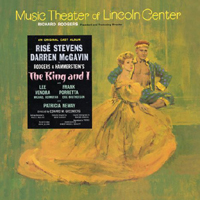 Music Theater of Lincoln Center Cast, 1965 (RCA)
Music Theater of Lincoln Center Cast, 1965 (RCA)  (3 / 5) The King and I was the inaugural production of the regrettably short-lived Music Theater of Lincoln Center — Richard Rodgers, producer. The major news about this cast album was that it contained the first recording of the “Small House of Uncle Thomas” ballet (in a skillfully edited version), supervised by Rodgers and featuring Lee Venora as a superb Tuptim. Risë Stevens is a gushingly operatic Anna, Darren McGavin as the King makes a strong showing in “A Puzzlement,” Frank Poretta lends his glorious tenor to the Lun Tha/Tuptim duets, and Patricia Neway is a supremely stately Lady Thiang. (Note: The CD/digital edition of the album includes Neway and the women singing “Western People Funny,” which did not make the cut for the original LP edition, presumably because there wasn’t room for it). — J.D.
(3 / 5) The King and I was the inaugural production of the regrettably short-lived Music Theater of Lincoln Center — Richard Rodgers, producer. The major news about this cast album was that it contained the first recording of the “Small House of Uncle Thomas” ballet (in a skillfully edited version), supervised by Rodgers and featuring Lee Venora as a superb Tuptim. Risë Stevens is a gushingly operatic Anna, Darren McGavin as the King makes a strong showing in “A Puzzlement,” Frank Poretta lends his glorious tenor to the Lun Tha/Tuptim duets, and Patricia Neway is a supremely stately Lady Thiang. (Note: The CD/digital edition of the album includes Neway and the women singing “Western People Funny,” which did not make the cut for the original LP edition, presumably because there wasn’t room for it). — J.D.
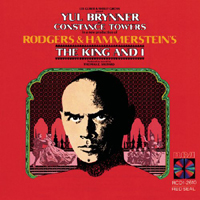 Broadway Cast, 1977 (RCA)
Broadway Cast, 1977 (RCA)  (4 / 5) A lot of previously unrecorded music from The King and I (but not the “Small House of Uncle Thomas” ballet) can be heard here. Included are the offstage chorus that leads into “I Whistle a Happy Tune,” the crossover scene of monks chanting in counterpoint to the King’s children singing”Home Sweet Home,” the charming “Royal Bangkok Academy” song, the reprise of “A Puzzlement” for Anna’s son, Louis, and Prince Chulalongkorn, the droll “Western People Funny,” the lovely instrumental “Dance of Edward and Anna,” and the finales of Acts I and II. The completeness of this recording gives Yul Brynner a much stronger presence than displayed on the original Broadway album or the film soundtrack. Constance Towers is in excellent voice as Anna, even if she’s hampered occasionally by some of conductor Milton Rosenstock’s slow tempi. June Angela and Martin Vidnovic are fine as the “young lovers,” but this is the first recording to make adjustments in “I Have Dreamed,” giving Lun Tha more and Tuptim less of the second chorus. A wiser idea was the casting of an Asian actress as Lady Thiang, and Hye-Young Choi’s beautiful singing helped make this concept de rigueur for subsequent stagings. The original orchestrations sound excellent here, and the inclusion of so much music and dialogue earns-this recording a worthy place next to the original Broadway cast album. — J.D.
(4 / 5) A lot of previously unrecorded music from The King and I (but not the “Small House of Uncle Thomas” ballet) can be heard here. Included are the offstage chorus that leads into “I Whistle a Happy Tune,” the crossover scene of monks chanting in counterpoint to the King’s children singing”Home Sweet Home,” the charming “Royal Bangkok Academy” song, the reprise of “A Puzzlement” for Anna’s son, Louis, and Prince Chulalongkorn, the droll “Western People Funny,” the lovely instrumental “Dance of Edward and Anna,” and the finales of Acts I and II. The completeness of this recording gives Yul Brynner a much stronger presence than displayed on the original Broadway album or the film soundtrack. Constance Towers is in excellent voice as Anna, even if she’s hampered occasionally by some of conductor Milton Rosenstock’s slow tempi. June Angela and Martin Vidnovic are fine as the “young lovers,” but this is the first recording to make adjustments in “I Have Dreamed,” giving Lun Tha more and Tuptim less of the second chorus. A wiser idea was the casting of an Asian actress as Lady Thiang, and Hye-Young Choi’s beautiful singing helped make this concept de rigueur for subsequent stagings. The original orchestrations sound excellent here, and the inclusion of so much music and dialogue earns-this recording a worthy place next to the original Broadway cast album. — J.D.
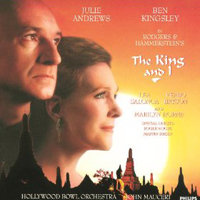 Studio Cast, 1992 (Phillips)
Studio Cast, 1992 (Phillips)  (3 / 5) Despite what sounds like a dream cast in the leading roles, this recording is strangely underpowered. It uses the arrangements and orchestrations from the film version of The King and I, which had internal cuts in many of the songs. On the plus side, several sections of dialogue are included, lending dramatic context to some numbers. The casting of Julie Andrews as Anna benefits the recording greatly. Ben Kingsley offers a well-sung, dramatic King, Marilyn Horne sings a majestic “Something Wonderful,” and if we must have a pop-vocalist approach to Tuptim and Lun Tha, Lea Salonga and Peabo Bryson at least sound tasteful and pleasant. If you are a fan of Andrews and have always longed to hear her as Anna, this recording is a must. The fact that her voice is not in pristine shape here matters little; her mere presence in the role, which fits her like a glove, makes up for any deficiencies. — J.D.
(3 / 5) Despite what sounds like a dream cast in the leading roles, this recording is strangely underpowered. It uses the arrangements and orchestrations from the film version of The King and I, which had internal cuts in many of the songs. On the plus side, several sections of dialogue are included, lending dramatic context to some numbers. The casting of Julie Andrews as Anna benefits the recording greatly. Ben Kingsley offers a well-sung, dramatic King, Marilyn Horne sings a majestic “Something Wonderful,” and if we must have a pop-vocalist approach to Tuptim and Lun Tha, Lea Salonga and Peabo Bryson at least sound tasteful and pleasant. If you are a fan of Andrews and have always longed to hear her as Anna, this recording is a must. The fact that her voice is not in pristine shape here matters little; her mere presence in the role, which fits her like a glove, makes up for any deficiencies. — J.D.
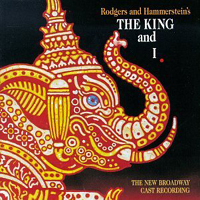 Broadway Cast, 1996 (Varèse Sarabande)
Broadway Cast, 1996 (Varèse Sarabande)  (2 / 5) This revival starred Donna Murphy and Lou Diamond Phillips. While their singing was fine, what made their performances noteworthy was the revelatory acting that they brought to many scenes. Happily, a good amount of their dialogue is included on this recording. It gets down to business immediately with an overture that is really no more than a brief prelude and goes right into the Anna/Louis scene containing “I Whistle a Happy Tune.” Some listeners may have problems with Murphy’s use of chest tones rather than the expected soprano for Anna, but her “Hello, Young Lovers” comes from a place of great depth, and her “Shall I Tell You What I Think of You?” is compelling. However, “Getting to Know You” seems painfully slow, even if Murphy’s performance almost justifies the tempo. Phillips explores ”A Puzzlement” with such spontaneity that you may feel you are hearing it for the first time. Together, the stars score quite well in the scene leading into the finale of Act I and in the “Shall We Dance?” sequence — but, somehow, that song does not soar musically. This cast album also boasts many rarely recorded inclusions: “Confrontation” (between Anna and the Kralahome); “Procession of the White Elephant,” with dialogue from the Kralahome, Captain Orton, and Prince Chulalongkorn; “The Letter,” read by Anna to Lady Thiang; and the final scene, wherein Jimmy Higa as the Prince makes a game attempt at becoming kingly. As Tuptim and Lun Tha, Joohee Choi and Jose Llana were heartbreaking lovers onstage, but they come across as rather bland here. On the plus side, Taewon Yi Kim makes an impact as Lady Thiang; her”Something Wonderful” is enhanced by the inclusion of her scene with the Kralahome, in which Randall Duk Kim’s presence is strong. Still, what was a thrilling stage experience is not fully captured on this recording. — J.D.
(2 / 5) This revival starred Donna Murphy and Lou Diamond Phillips. While their singing was fine, what made their performances noteworthy was the revelatory acting that they brought to many scenes. Happily, a good amount of their dialogue is included on this recording. It gets down to business immediately with an overture that is really no more than a brief prelude and goes right into the Anna/Louis scene containing “I Whistle a Happy Tune.” Some listeners may have problems with Murphy’s use of chest tones rather than the expected soprano for Anna, but her “Hello, Young Lovers” comes from a place of great depth, and her “Shall I Tell You What I Think of You?” is compelling. However, “Getting to Know You” seems painfully slow, even if Murphy’s performance almost justifies the tempo. Phillips explores ”A Puzzlement” with such spontaneity that you may feel you are hearing it for the first time. Together, the stars score quite well in the scene leading into the finale of Act I and in the “Shall We Dance?” sequence — but, somehow, that song does not soar musically. This cast album also boasts many rarely recorded inclusions: “Confrontation” (between Anna and the Kralahome); “Procession of the White Elephant,” with dialogue from the Kralahome, Captain Orton, and Prince Chulalongkorn; “The Letter,” read by Anna to Lady Thiang; and the final scene, wherein Jimmy Higa as the Prince makes a game attempt at becoming kingly. As Tuptim and Lun Tha, Joohee Choi and Jose Llana were heartbreaking lovers onstage, but they come across as rather bland here. On the plus side, Taewon Yi Kim makes an impact as Lady Thiang; her”Something Wonderful” is enhanced by the inclusion of her scene with the Kralahome, in which Randall Duk Kim’s presence is strong. Still, what was a thrilling stage experience is not fully captured on this recording. — J.D.
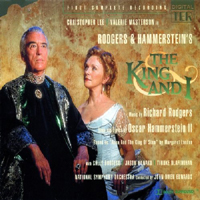 Studio Cast, 1997 (JAY, 2CDs)
Studio Cast, 1997 (JAY, 2CDs)  (4 / 5) This is a note-complete recording of the score, with a very suitable cast led by British opera star Valerie Masterson and film star Christopher Lee, superbly conducted by John Owen Edwards. Here we have the first absolutely full recording of the “Small House of Uncle Thomas” ballet, and only the second recording of the charming “A Puzzlement” reprise for Louis and Prince Chululongkorn. Overall, the score is very well sung, and a worthy attempt was made to create a dramatic listening experience. Masterson sings earnestly throughout, Lee is suitably grave (if a bit humorless), and in the role of Lady Thiang, Sally Burgess offers a splendid performance of “Something Wonderful.” As the lovers Lun Tha and Tuptim, Jason Howard and Tinuke Olafimihan might have been oddly matched in a stage production, but they sound terrific here. This is a necessary recording for anyone who truly loves The King and I. — J.D.
(4 / 5) This is a note-complete recording of the score, with a very suitable cast led by British opera star Valerie Masterson and film star Christopher Lee, superbly conducted by John Owen Edwards. Here we have the first absolutely full recording of the “Small House of Uncle Thomas” ballet, and only the second recording of the charming “A Puzzlement” reprise for Louis and Prince Chululongkorn. Overall, the score is very well sung, and a worthy attempt was made to create a dramatic listening experience. Masterson sings earnestly throughout, Lee is suitably grave (if a bit humorless), and in the role of Lady Thiang, Sally Burgess offers a splendid performance of “Something Wonderful.” As the lovers Lun Tha and Tuptim, Jason Howard and Tinuke Olafimihan might have been oddly matched in a stage production, but they sound terrific here. This is a necessary recording for anyone who truly loves The King and I. — J.D.
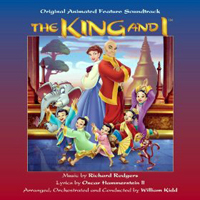 Animated Film Soundtrack, 1999 (Sony) No stars; not recommended. If you think of this as a studio cast recording, rather than a soundtrack recording, you might get through it without grimacing. The singing of Christiane Noll as Anna and Martin Vidnovic as the King is excellent, but anyone who has seen the animated film that yielded this soundtrack album will find it impossible to shake off that awful memory. Here’s a scary thought: One day, a kid will be sitting in a theater at a revival of The King and I, and when “I Whistle a Happy Tune” begins, the child will ask: “Mommy, where’s the dragon?” — J.D.
Animated Film Soundtrack, 1999 (Sony) No stars; not recommended. If you think of this as a studio cast recording, rather than a soundtrack recording, you might get through it without grimacing. The singing of Christiane Noll as Anna and Martin Vidnovic as the King is excellent, but anyone who has seen the animated film that yielded this soundtrack album will find it impossible to shake off that awful memory. Here’s a scary thought: One day, a kid will be sitting in a theater at a revival of The King and I, and when “I Whistle a Happy Tune” begins, the child will ask: “Mommy, where’s the dragon?” — J.D.
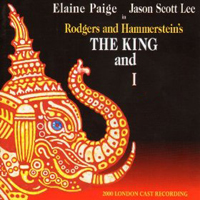 London Cast, 2000 (WEA-Warner Music)
London Cast, 2000 (WEA-Warner Music)  (4 / 5) With the casting of Elaine Paige as Anna, it was evident that this London revival and cast album would be defined by the sterling vocal powers of the leading lady. Not only is Paige’s singing expectedly excellent, her acting is top-notch, and all other elements of this recording very strong. Instead of slavishly imitating the 1996 Broadway cast album, producer Mike Moran took a fresh approach with this recording, giving it a dramatic tension that’s sustained throughout its 70 minutes. The brief prelude is rich, taking us into the Captain Orton scene with Louis, then to Anna’s entrance as Paige sings a beguiling “I Whistle a Happy Tune.” Her magic continues in “Hello, Young Lovers” and “Getting to Know You.” Paige’s “Shall I Tell You What I Think of You?” reveals a mixture of humor, anger, warmth, and bottled-up fury. As the King, Jason Scott Lee delivers “A Puzzlement” and “Song of the King” with brio, and he and Paige wring everything possible out of “Shall We Dance?” As Lady Thiang, Taewon Yi Kim, who was also in the 1996 Broadway production, evinces a deeper understanding of the character now; this influences her singing of “Something Wonderful” to stunning effect. Tuptim’s “My Lord and Master” is sung with intensity and some welcome anger by Aura Deva, who also adds urgency to “We Kiss in a Shadow.” Sean Ghazi as Lun Tha is equally impressive here, and the well-played scene following the song gives the reprise enormous weight. Then this Tuptim and Lun Tha bring a totally different quality to “I Have Dreamed”; no longer fearful, their voices glide to a sweeter place as they ardently caress this glorious Rodgers and Hammerstein song. Other delights: Alexander Deng is an excellent Prince who will be King, and the entire “Small House of Uncle Thomas” ballet is included under the direction of John Owen Edwards’ skillful baton. So, what’s missing that was on the 1996 Broadway album? “Royal Dance Before the King,” “Procession of the White Elephant,” the reprise of “Something Wonderful,” and some dialogue. But with the excitement that this recording whips up, let’s not quibble. — J.D.
(4 / 5) With the casting of Elaine Paige as Anna, it was evident that this London revival and cast album would be defined by the sterling vocal powers of the leading lady. Not only is Paige’s singing expectedly excellent, her acting is top-notch, and all other elements of this recording very strong. Instead of slavishly imitating the 1996 Broadway cast album, producer Mike Moran took a fresh approach with this recording, giving it a dramatic tension that’s sustained throughout its 70 minutes. The brief prelude is rich, taking us into the Captain Orton scene with Louis, then to Anna’s entrance as Paige sings a beguiling “I Whistle a Happy Tune.” Her magic continues in “Hello, Young Lovers” and “Getting to Know You.” Paige’s “Shall I Tell You What I Think of You?” reveals a mixture of humor, anger, warmth, and bottled-up fury. As the King, Jason Scott Lee delivers “A Puzzlement” and “Song of the King” with brio, and he and Paige wring everything possible out of “Shall We Dance?” As Lady Thiang, Taewon Yi Kim, who was also in the 1996 Broadway production, evinces a deeper understanding of the character now; this influences her singing of “Something Wonderful” to stunning effect. Tuptim’s “My Lord and Master” is sung with intensity and some welcome anger by Aura Deva, who also adds urgency to “We Kiss in a Shadow.” Sean Ghazi as Lun Tha is equally impressive here, and the well-played scene following the song gives the reprise enormous weight. Then this Tuptim and Lun Tha bring a totally different quality to “I Have Dreamed”; no longer fearful, their voices glide to a sweeter place as they ardently caress this glorious Rodgers and Hammerstein song. Other delights: Alexander Deng is an excellent Prince who will be King, and the entire “Small House of Uncle Thomas” ballet is included under the direction of John Owen Edwards’ skillful baton. So, what’s missing that was on the 1996 Broadway album? “Royal Dance Before the King,” “Procession of the White Elephant,” the reprise of “Something Wonderful,” and some dialogue. But with the excitement that this recording whips up, let’s not quibble. — J.D.
 Broadway Cast, 2015 (Universal Music Classics-Decca Broadway)
Broadway Cast, 2015 (Universal Music Classics-Decca Broadway)  (3 / 5) While the Lincoln Center Theater production that yielded this recording was gorgeous and compelling, the performance of the score as recorded on the cast album and heard in isolation is disappointing in several respects. Kelli O’Hara brings her famously beautiful voice to Anna’s music, but her tendency to sing much of the part very lightly and lyrically, plus some uncharacteristic toying with phrasing, does not make for ideal interpretations of these immortal songs. The energy and grit that O’Hara evidenced in the show’s book scenes, which helped win her a Tony Award, are present here only intermittently. Ruthie Ann Miles as Lady Thiang also won a Tony for her performance, yet she does not have quite the sumptuous vocal tone one wants to hear in “Something Wonderful,” nor is the rather pop-ish quality of her phrasing and pronunciation right for the character. Conrad Ricamora as Lun Tha sounds strained and uncomfortable in the higher-lying measures of “We Kiss in a Shadow” and “I Have Dreamed”; Ashley Park fares considerably better as Tuptim. Although Ken Watanabe’s heavy accent and less than sturdy singing in the role of the King came in for some criticism, his performance on the cast album is strong, charismatic, and engaging. The orchestra sounds great under musical director/conductor Ted Sperling, but the overture is marred by the inexplicable addition of “Shall We Dance?” Finally, this recording includes a lovingly conducted, skillfully edited version of the “Small House of Uncle Thomas” ballet that’s undercut to some degree by Park’s melodramatic, shouty delivery of Tuptim’s narration. — Michael Portantiere
(3 / 5) While the Lincoln Center Theater production that yielded this recording was gorgeous and compelling, the performance of the score as recorded on the cast album and heard in isolation is disappointing in several respects. Kelli O’Hara brings her famously beautiful voice to Anna’s music, but her tendency to sing much of the part very lightly and lyrically, plus some uncharacteristic toying with phrasing, does not make for ideal interpretations of these immortal songs. The energy and grit that O’Hara evidenced in the show’s book scenes, which helped win her a Tony Award, are present here only intermittently. Ruthie Ann Miles as Lady Thiang also won a Tony for her performance, yet she does not have quite the sumptuous vocal tone one wants to hear in “Something Wonderful,” nor is the rather pop-ish quality of her phrasing and pronunciation right for the character. Conrad Ricamora as Lun Tha sounds strained and uncomfortable in the higher-lying measures of “We Kiss in a Shadow” and “I Have Dreamed”; Ashley Park fares considerably better as Tuptim. Although Ken Watanabe’s heavy accent and less than sturdy singing in the role of the King came in for some criticism, his performance on the cast album is strong, charismatic, and engaging. The orchestra sounds great under musical director/conductor Ted Sperling, but the overture is marred by the inexplicable addition of “Shall We Dance?” Finally, this recording includes a lovingly conducted, skillfully edited version of the “Small House of Uncle Thomas” ballet that’s undercut to some degree by Park’s melodramatic, shouty delivery of Tuptim’s narration. — Michael Portantiere
Kelly
 Studio Cast, 1998 (Original Cast Records)
Studio Cast, 1998 (Original Cast Records)  (1 / 5) Kelly closed on its opening night (February 6, 1965), and this latter-day studio recording shows why it was one of the biggest flops of the 1960s. Eddie Lawrence’s book focuses on the title character, Hop Kelly, a young Irish immigrant who plans to jump off the Brooklyn Bridge for fame and profit, but the sketchy notes in the CD booklet provide few clues as to how the plot develops. The score, with music by Moose Charlap and lyrics by Lawrence, is a raucous evocation of 1880s New York that reaches for a Brecht-Weill astringency without achieving it; but there is a standout section in “I’ll Never Go There Anymore,” an ambitious musical-dramatic scene built around a song with a haunting melody. In the roles of Kelly and his love interest, Angela, Brian d’Arcy James and Sally Mayes make their material seem better than it is. (Mayes shares Angela’s numbers with pop singer Sandy Stewart, who was married to Charlap.) Lawrence himself appears in several numbers on the album, and there are also contributions from solid pros Marcia Lewis, Jane Connell, Conrad John Schuck, and George S. Irving, though they’re pretty much defeated by the generally monotonous melodies and sub-par lyrics. A bonus track features Stewart in a lovely 1965 recording of “I’ll Never Go There Anymore.” — David Barbour
(1 / 5) Kelly closed on its opening night (February 6, 1965), and this latter-day studio recording shows why it was one of the biggest flops of the 1960s. Eddie Lawrence’s book focuses on the title character, Hop Kelly, a young Irish immigrant who plans to jump off the Brooklyn Bridge for fame and profit, but the sketchy notes in the CD booklet provide few clues as to how the plot develops. The score, with music by Moose Charlap and lyrics by Lawrence, is a raucous evocation of 1880s New York that reaches for a Brecht-Weill astringency without achieving it; but there is a standout section in “I’ll Never Go There Anymore,” an ambitious musical-dramatic scene built around a song with a haunting melody. In the roles of Kelly and his love interest, Angela, Brian d’Arcy James and Sally Mayes make their material seem better than it is. (Mayes shares Angela’s numbers with pop singer Sandy Stewart, who was married to Charlap.) Lawrence himself appears in several numbers on the album, and there are also contributions from solid pros Marcia Lewis, Jane Connell, Conrad John Schuck, and George S. Irving, though they’re pretty much defeated by the generally monotonous melodies and sub-par lyrics. A bonus track features Stewart in a lovely 1965 recording of “I’ll Never Go There Anymore.” — David Barbour
Kean
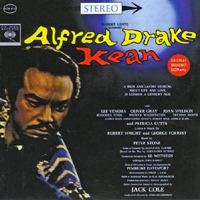 Broadway Cast, 1961 (Columbia/DRG)
Broadway Cast, 1961 (Columbia/DRG)  (5 / 5) Some people may think of Robert Wright and George Forrest as mere “adapters” because the team famously took the works of classical composers and massaged them into such musicals as Song of Norway and Kismet, but here’s proof positive that they could craft their own wonderful music and lyrics. Based on a play by Dumas, the show tells a somewhat true version of the life story of the man who at one time was considered Britain’s greatest actor, Edmund Kean. In the title role, Alfred Drake is in top form as he delivers the romantic ballads “Sweet Danger” and “To Look Upon My Love” and the comedic “Civilized People,” proving again that he could do it all. As for the song “Elena,” had that name been as popular in 1961 as Maria was in 1957, the Kean tune might have become as popular as that little number from West Side Story. There’s much more to like here, including the rollicking “The Fog and the Grog,” the swirling waltz “Swept Away,” and, in “Penny Plain, Twopence Colored,” the most glorious melisma in all musical theater — six measures long, and exquisitely sung by Alfred De Sio. Finally, Drake gets to put over a highbrow answer to “Rose’s Turn” in “Apology,” crafted by the songwriters and librettist Peter Stone. Kean is an underrated musical that’s worth a listen. — Peter Filichia
(5 / 5) Some people may think of Robert Wright and George Forrest as mere “adapters” because the team famously took the works of classical composers and massaged them into such musicals as Song of Norway and Kismet, but here’s proof positive that they could craft their own wonderful music and lyrics. Based on a play by Dumas, the show tells a somewhat true version of the life story of the man who at one time was considered Britain’s greatest actor, Edmund Kean. In the title role, Alfred Drake is in top form as he delivers the romantic ballads “Sweet Danger” and “To Look Upon My Love” and the comedic “Civilized People,” proving again that he could do it all. As for the song “Elena,” had that name been as popular in 1961 as Maria was in 1957, the Kean tune might have become as popular as that little number from West Side Story. There’s much more to like here, including the rollicking “The Fog and the Grog,” the swirling waltz “Swept Away,” and, in “Penny Plain, Twopence Colored,” the most glorious melisma in all musical theater — six measures long, and exquisitely sung by Alfred De Sio. Finally, Drake gets to put over a highbrow answer to “Rose’s Turn” in “Apology,” crafted by the songwriters and librettist Peter Stone. Kean is an underrated musical that’s worth a listen. — Peter Filichia
Kat and the Kings
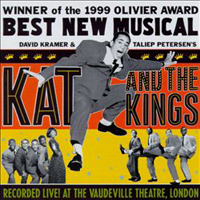 Original London Cast, 1998 (First Night/Relativity)
Original London Cast, 1998 (First Night/Relativity)  (2 / 5) The good thing about this cast album, recorded live at London’s Vaudeville Theatre, is that it allows you to avoid the show’s well-meaning but hackneyed book and focus on the peppy, doo-wop music that gave this Olivier Award-winning musical its spark. The songs, by David Kramer and Taliep Petersen, may be only imitations of the ’50s-’60s classics that inspired them, but they do exhibit pleasant harmonies and toe-tapping beats. And they’re delivered with enthusiasm by the wonderful young cast members in this story of a group of friends in apartheid-era South Africa who aspire to rock stardom but encounter obstacles at every turn. Happily, the CD booklet contains all the lyrics; but even more welcome would have been a synopsis and background on the show, which was apparently a labor of love for its South African company and creators. Their good intentions are not enough to make Kat and the Kings essential for your cast album collection, but it’s an enjoyable listen. — Brooke Pierce
(2 / 5) The good thing about this cast album, recorded live at London’s Vaudeville Theatre, is that it allows you to avoid the show’s well-meaning but hackneyed book and focus on the peppy, doo-wop music that gave this Olivier Award-winning musical its spark. The songs, by David Kramer and Taliep Petersen, may be only imitations of the ’50s-’60s classics that inspired them, but they do exhibit pleasant harmonies and toe-tapping beats. And they’re delivered with enthusiasm by the wonderful young cast members in this story of a group of friends in apartheid-era South Africa who aspire to rock stardom but encounter obstacles at every turn. Happily, the CD booklet contains all the lyrics; but even more welcome would have been a synopsis and background on the show, which was apparently a labor of love for its South African company and creators. Their good intentions are not enough to make Kat and the Kings essential for your cast album collection, but it’s an enjoyable listen. — Brooke Pierce
Juno
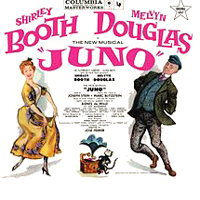 Original Broadway Cast, 1959 (Colurnbia/Fynsworth Alley)
Original Broadway Cast, 1959 (Colurnbia/Fynsworth Alley)  (4 / 5) For years, cast album collectors begged Columbia to issue this heartbreaker on CD. Finally, Fynsworth Alley got the rights and released a CD in 2002. In adapting Sean O’Casey’s Dublin tragicomedy Juno and the Paycock to the musical stage, composer-lyricist Marc Blitzstein and librettist Joseph Stein showed considerable theatrical savvy and the utmost integrity. Their thrilling score opens with “We’re Alive,” a jaunty march that ends in tragedy and turns into a dirge. Immediately after it comes “I Wish It So,” one of three arresting ballads assigned to the lucky singer Monte Amundsen in the role of Mary Boyle. Then Shirley Booth acts “Song of the Ma” to the core (its verse is by O’Casey himself), and her approximate note-hitting proves to be just right for this overburdened character. The rest of the cast is also amazing: Melvyn Douglas (like Booth, he has not much of a singing voice but is a wonderful actor), Tommy Rall, Jean Stapleton, Nancy Andrews, Sada Thompson, Jack MacGowran, and Loren Driscoll (who holds one of the longest notes ever attempted at the end of “One Kind Word”). First-class all the way, the album was produced by Goddard Lieberson; the orchestrations are by Robert Russell Bennett, Hershy Kay, and Blitzstein; and the conductor is Robert Emmett Dolan, an underappreciated Broadway composer himself. Blitzstein does overreach toward the end with a pompous “Hymn” and some noisy ballet music (Agnes De Mille choreographed), but even here, one admires his ambition and his refusal to cheapen the material with standard audience-pleasing tactics. — Marc Miller
(4 / 5) For years, cast album collectors begged Columbia to issue this heartbreaker on CD. Finally, Fynsworth Alley got the rights and released a CD in 2002. In adapting Sean O’Casey’s Dublin tragicomedy Juno and the Paycock to the musical stage, composer-lyricist Marc Blitzstein and librettist Joseph Stein showed considerable theatrical savvy and the utmost integrity. Their thrilling score opens with “We’re Alive,” a jaunty march that ends in tragedy and turns into a dirge. Immediately after it comes “I Wish It So,” one of three arresting ballads assigned to the lucky singer Monte Amundsen in the role of Mary Boyle. Then Shirley Booth acts “Song of the Ma” to the core (its verse is by O’Casey himself), and her approximate note-hitting proves to be just right for this overburdened character. The rest of the cast is also amazing: Melvyn Douglas (like Booth, he has not much of a singing voice but is a wonderful actor), Tommy Rall, Jean Stapleton, Nancy Andrews, Sada Thompson, Jack MacGowran, and Loren Driscoll (who holds one of the longest notes ever attempted at the end of “One Kind Word”). First-class all the way, the album was produced by Goddard Lieberson; the orchestrations are by Robert Russell Bennett, Hershy Kay, and Blitzstein; and the conductor is Robert Emmett Dolan, an underappreciated Broadway composer himself. Blitzstein does overreach toward the end with a pompous “Hymn” and some noisy ballet music (Agnes De Mille choreographed), but even here, one admires his ambition and his refusal to cheapen the material with standard audience-pleasing tactics. — Marc Miller
Jumbo
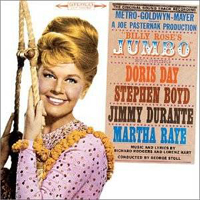 Film Soundtrack, 1962 (Columbia/Sony)
Film Soundtrack, 1962 (Columbia/Sony)  (3 / 5) In these days of multi-million-dollar Broadway mega-musicals, it’s interesting to note that a 1935 show nearly created a scandal because it was budgeted at $350,000. High-rolling producer Billy Rose was responsible for that near-obscene outlay of cash, which he lavished upon a musical spectacle — literally a circus — called Jumbo. It ran at the mammoth Hippodrome, refitted as a three-ring arena for a production that featured a number of circus acts, a Romeo-and-Juliet-under-the-big-top plot, the antics of Jimmy Durante, and a wonderful score by Richard Rodgers and Lorenz Hart. The show was too expensive to recoup its investment, and it soon passed into legend, but three of its songs — “My Romance,” “The Most Beautiful Girl in the World,” and “Little Girl Blue” — became standards. When Jumbo made it to the screen in 1962 (with Billy Rose’s name included in the title), not even the world’s top box-office draw, Doris Day, could turn the film into a financial success. Nevertheless, the soundtrack recording is bouncy and enjoyable, with Day in strong voice. Durante repeated his stage role, and his reprise of “The Most Beautiful Girl in the World” is captivating. Martha Raye is a delight as his long-suffering fiancée. Most often remembered as a wide-mouthed clown, Raye was an accomplished vocalist; this becomes clear when she duets with Day in “Why Can’t I?”, one of several R&H interpolations. Leading man Stephen Boyd’s songs were dubbed by the strong-voiced James Joyce (how’s that for an Irish name?), and the score was further padded with Roger Edens’ “Sawdust, Spangles, and Dreams.” Since there is no cast album of the stage production of Jumbo, it’s nice to have selections from the entertaining film soundtrack on disc. — Richard Barrios
(3 / 5) In these days of multi-million-dollar Broadway mega-musicals, it’s interesting to note that a 1935 show nearly created a scandal because it was budgeted at $350,000. High-rolling producer Billy Rose was responsible for that near-obscene outlay of cash, which he lavished upon a musical spectacle — literally a circus — called Jumbo. It ran at the mammoth Hippodrome, refitted as a three-ring arena for a production that featured a number of circus acts, a Romeo-and-Juliet-under-the-big-top plot, the antics of Jimmy Durante, and a wonderful score by Richard Rodgers and Lorenz Hart. The show was too expensive to recoup its investment, and it soon passed into legend, but three of its songs — “My Romance,” “The Most Beautiful Girl in the World,” and “Little Girl Blue” — became standards. When Jumbo made it to the screen in 1962 (with Billy Rose’s name included in the title), not even the world’s top box-office draw, Doris Day, could turn the film into a financial success. Nevertheless, the soundtrack recording is bouncy and enjoyable, with Day in strong voice. Durante repeated his stage role, and his reprise of “The Most Beautiful Girl in the World” is captivating. Martha Raye is a delight as his long-suffering fiancée. Most often remembered as a wide-mouthed clown, Raye was an accomplished vocalist; this becomes clear when she duets with Day in “Why Can’t I?”, one of several R&H interpolations. Leading man Stephen Boyd’s songs were dubbed by the strong-voiced James Joyce (how’s that for an Irish name?), and the score was further padded with Roger Edens’ “Sawdust, Spangles, and Dreams.” Since there is no cast album of the stage production of Jumbo, it’s nice to have selections from the entertaining film soundtrack on disc. — Richard Barrios
Joseph and the Amazing Technicolor Dreamcoat
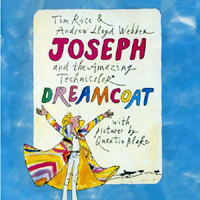 Studio Cast, 1974 (MCA)
Studio Cast, 1974 (MCA)  (3 / 5) In the early years of their partnership, composer Andrew Lloyd Webber and lyricist Tim Rice were inspired by Biblical lore. Joseph and the Amazing Technicolor Dreamcoat was first presented as a brief pop cantata (about 15 minutes in length) at the Colet Court School in London in 1968, and that short piece was recorded in 1969. Following the huge success of the original recording of Lloyd Webber and Rice’s Jesus Christ Superstar, the earlier work received stage performances beginning in 1970, and was expanded for recordings in 1971 and 1972. Joseph… was produced in London’s West End in 1973, and that production led to this full studio recording. Whereas Superstar had drawn on the New Testament, Joseph… is a soft-rock musical based on the Old Testament tale of a young man who is betrayed by his brothers before becoming a powerful figure in Egypt. The score is clever, with plenty of variety. Joseph’s brothers get most of the humorous songs: a western tune, “One More Angel in Heaven”; a French-style drinking song, “Those Canaan Days”; and the “Benjamin Calypso.” An Elvis takeoff for the Pharaoh is thrown in for good measure. Peter Reeves is good as the Narrator; he is the only male to sing the role on any of the recordings under review here. Gary Bond is fine as Joseph, and his “Close Every Door” is a highlight of the disc. Although this recording doesn’t represent the score as later expanded, it’s a nice piece of history and a good listen. — Matthew Murray
(3 / 5) In the early years of their partnership, composer Andrew Lloyd Webber and lyricist Tim Rice were inspired by Biblical lore. Joseph and the Amazing Technicolor Dreamcoat was first presented as a brief pop cantata (about 15 minutes in length) at the Colet Court School in London in 1968, and that short piece was recorded in 1969. Following the huge success of the original recording of Lloyd Webber and Rice’s Jesus Christ Superstar, the earlier work received stage performances beginning in 1970, and was expanded for recordings in 1971 and 1972. Joseph… was produced in London’s West End in 1973, and that production led to this full studio recording. Whereas Superstar had drawn on the New Testament, Joseph… is a soft-rock musical based on the Old Testament tale of a young man who is betrayed by his brothers before becoming a powerful figure in Egypt. The score is clever, with plenty of variety. Joseph’s brothers get most of the humorous songs: a western tune, “One More Angel in Heaven”; a French-style drinking song, “Those Canaan Days”; and the “Benjamin Calypso.” An Elvis takeoff for the Pharaoh is thrown in for good measure. Peter Reeves is good as the Narrator; he is the only male to sing the role on any of the recordings under review here. Gary Bond is fine as Joseph, and his “Close Every Door” is a highlight of the disc. Although this recording doesn’t represent the score as later expanded, it’s a nice piece of history and a good listen. — Matthew Murray
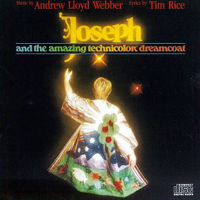 Original Broadway Cast, 1982 (Chrysalis)
Original Broadway Cast, 1982 (Chrysalis)  (4 / 5) For this production, first seen Off-Broadway and then on, Joseph… had a female Narrator. And what a Narrator she was! Laurie Beechman, with her vivacity and wonderful high belt, sets the standard for this role, which has been played by women in every subsequent major production. Bill Hutton is one of the best Josephs ever recorded; his rich low notes, warm middle register, and strong, secure high notes bring more colors to the character’s music than is often the case. Beechman, Hutton, the brothers, the female ensemble, and the fine orchestra, skillfully led by David Friedman, make this the most dazzling recording of the show, despite a few cuts in the score and a reduced orchestra. Highlights are numerous, including Beechman’s “You Are What You Feel,” Hutton’s “Close Every Door” and “Any Dream Will Do,” and Tom Carder’s rendition of the Pharaoh’s number. — M.M.
(4 / 5) For this production, first seen Off-Broadway and then on, Joseph… had a female Narrator. And what a Narrator she was! Laurie Beechman, with her vivacity and wonderful high belt, sets the standard for this role, which has been played by women in every subsequent major production. Bill Hutton is one of the best Josephs ever recorded; his rich low notes, warm middle register, and strong, secure high notes bring more colors to the character’s music than is often the case. Beechman, Hutton, the brothers, the female ensemble, and the fine orchestra, skillfully led by David Friedman, make this the most dazzling recording of the show, despite a few cuts in the score and a reduced orchestra. Highlights are numerous, including Beechman’s “You Are What You Feel,” Hutton’s “Close Every Door” and “Any Dream Will Do,” and Tom Carder’s rendition of the Pharaoh’s number. — M.M.
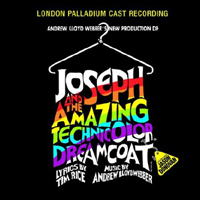 London Cast, 1991 (Polydor)
London Cast, 1991 (Polydor)  (2 / 5) This recording is most notable for its inclusion of the extensive “Joseph Megamix,” a finale reprise of the score’s best numbers. The album represents the show’s final version, but it’s far from definitive. In the title role, Jason Donovan is bland throughout, and Linzi Hateley lacks authority as the Narrator. The supporting players are also lukewarm; even David Easter’s Pharaoh fails to score, because his Elvis impersonation is so overdone. For these reasons, the recording is recommended only to diehard fans of the show. — M.M.
(2 / 5) This recording is most notable for its inclusion of the extensive “Joseph Megamix,” a finale reprise of the score’s best numbers. The album represents the show’s final version, but it’s far from definitive. In the title role, Jason Donovan is bland throughout, and Linzi Hateley lacks authority as the Narrator. The supporting players are also lukewarm; even David Easter’s Pharaoh fails to score, because his Elvis impersonation is so overdone. For these reasons, the recording is recommended only to diehard fans of the show. — M.M.
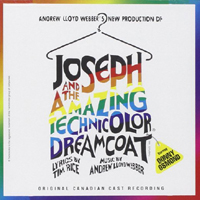 Original Canadian Cast, 1992 (Polydor)
Original Canadian Cast, 1992 (Polydor)  (3 / 5) Donny Osmond began his lengthy stint as Joseph in the show’s premiere Canadian production. He’s not the best vocalist to have taken the part, yet he brings to the role a likeability and tremendous sense of fun that keeps audiences invested in the character from start to finish. His “Any Dream Will Do” and “Close Every Door” are among the most moving renditions of those songs. Aside from anchoring the show, Osmond’s s performance reclaims star status for Joseph; as the Narrator, Janet Metz displays vocal finesse but lacks the charisma needed to make the character stand out from the ensemble. Even so, there’s a lot to like here, particularly the men playing Joseph’s brothers. Among them are such future Broadway names as Jeff Blumenkrantz, Timothy J. Alex, Vance Avery, Michael Berresse, and Rufus Bonds, Jr. — M.M.
(3 / 5) Donny Osmond began his lengthy stint as Joseph in the show’s premiere Canadian production. He’s not the best vocalist to have taken the part, yet he brings to the role a likeability and tremendous sense of fun that keeps audiences invested in the character from start to finish. His “Any Dream Will Do” and “Close Every Door” are among the most moving renditions of those songs. Aside from anchoring the show, Osmond’s s performance reclaims star status for Joseph; as the Narrator, Janet Metz displays vocal finesse but lacks the charisma needed to make the character stand out from the ensemble. Even so, there’s a lot to like here, particularly the men playing Joseph’s brothers. Among them are such future Broadway names as Jeff Blumenkrantz, Timothy J. Alex, Vance Avery, Michael Berresse, and Rufus Bonds, Jr. — M.M.
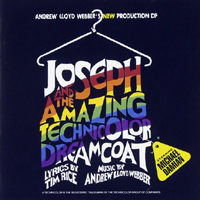 Los Angeles Cast, 1993 (Polydor)
Los Angeles Cast, 1993 (Polydor)  (3 / 5) The star of this recording of Joseph and the Amazing Technicolor Dreamcoat, soap-opera heartthrob Michael Damian, compensates for his vocal shortcomings with acting ability and charm. Kelli Rabke’s Narrator exhibits a great deal of vocal strength, but the singers to listen for are Broadway pros Clifford David (as Jacob and Potiphar), Bill Nolte (as the Baker and one of Joseph’s brothers), and Marc Kudisch and Willy Falk (as two other brothers). Robert Torti’s Pharaoh is excellent in his one big number. — M.M.
(3 / 5) The star of this recording of Joseph and the Amazing Technicolor Dreamcoat, soap-opera heartthrob Michael Damian, compensates for his vocal shortcomings with acting ability and charm. Kelli Rabke’s Narrator exhibits a great deal of vocal strength, but the singers to listen for are Broadway pros Clifford David (as Jacob and Potiphar), Bill Nolte (as the Baker and one of Joseph’s brothers), and Marc Kudisch and Willy Falk (as two other brothers). Robert Torti’s Pharaoh is excellent in his one big number. — M.M.
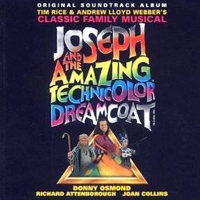 Video Soundtrack, 1999 (Really Useful Records)
Video Soundtrack, 1999 (Really Useful Records)  (3 / 5) Donny Osmond returned to the title role for a video production of Joseph … and gave another joyous performance. Joining him as the Narrator is the eminent West End star Maria Friedman, who sings brilliantly and exudes enough star presence to match Osmond’s. Richard Attenborough and Joan Collins are a hoot as Jacob and Mrs. Potiphar, respectively. The strong ensemble helps make this a fine recording of the expanded score. — M.M.
(3 / 5) Donny Osmond returned to the title role for a video production of Joseph … and gave another joyous performance. Joining him as the Narrator is the eminent West End star Maria Friedman, who sings brilliantly and exudes enough star presence to match Osmond’s. Richard Attenborough and Joan Collins are a hoot as Jacob and Mrs. Potiphar, respectively. The strong ensemble helps make this a fine recording of the expanded score. — M.M.

